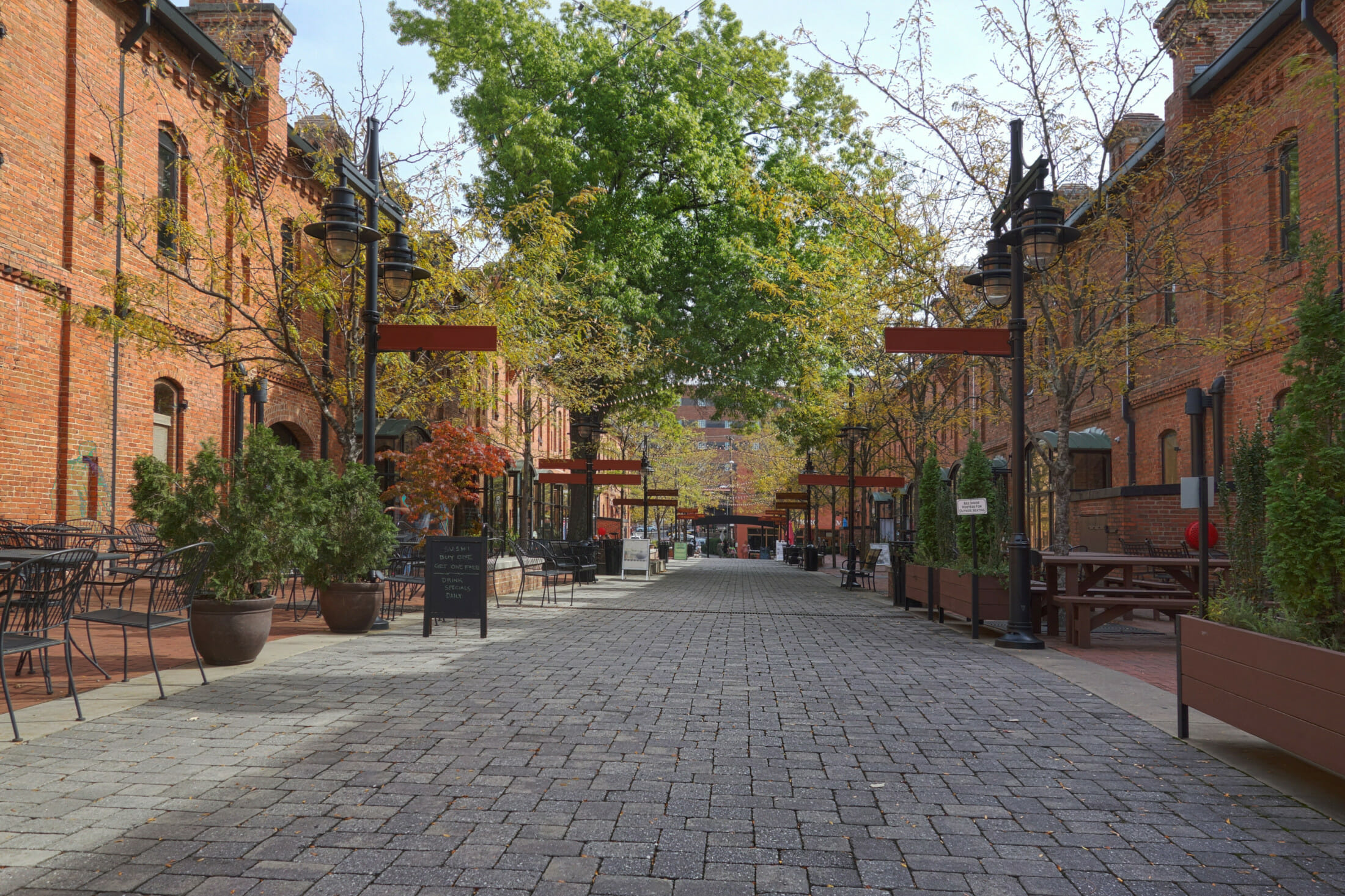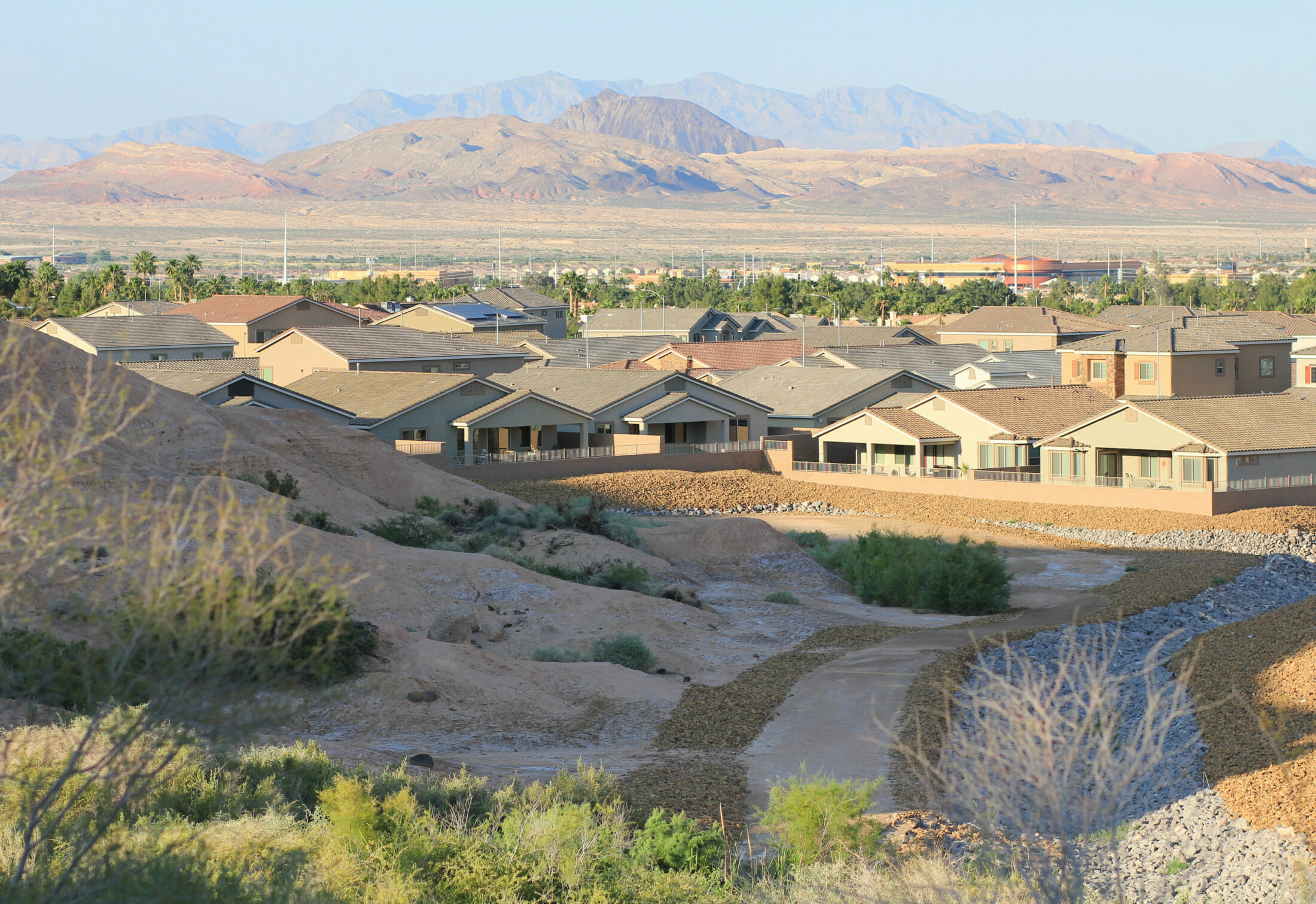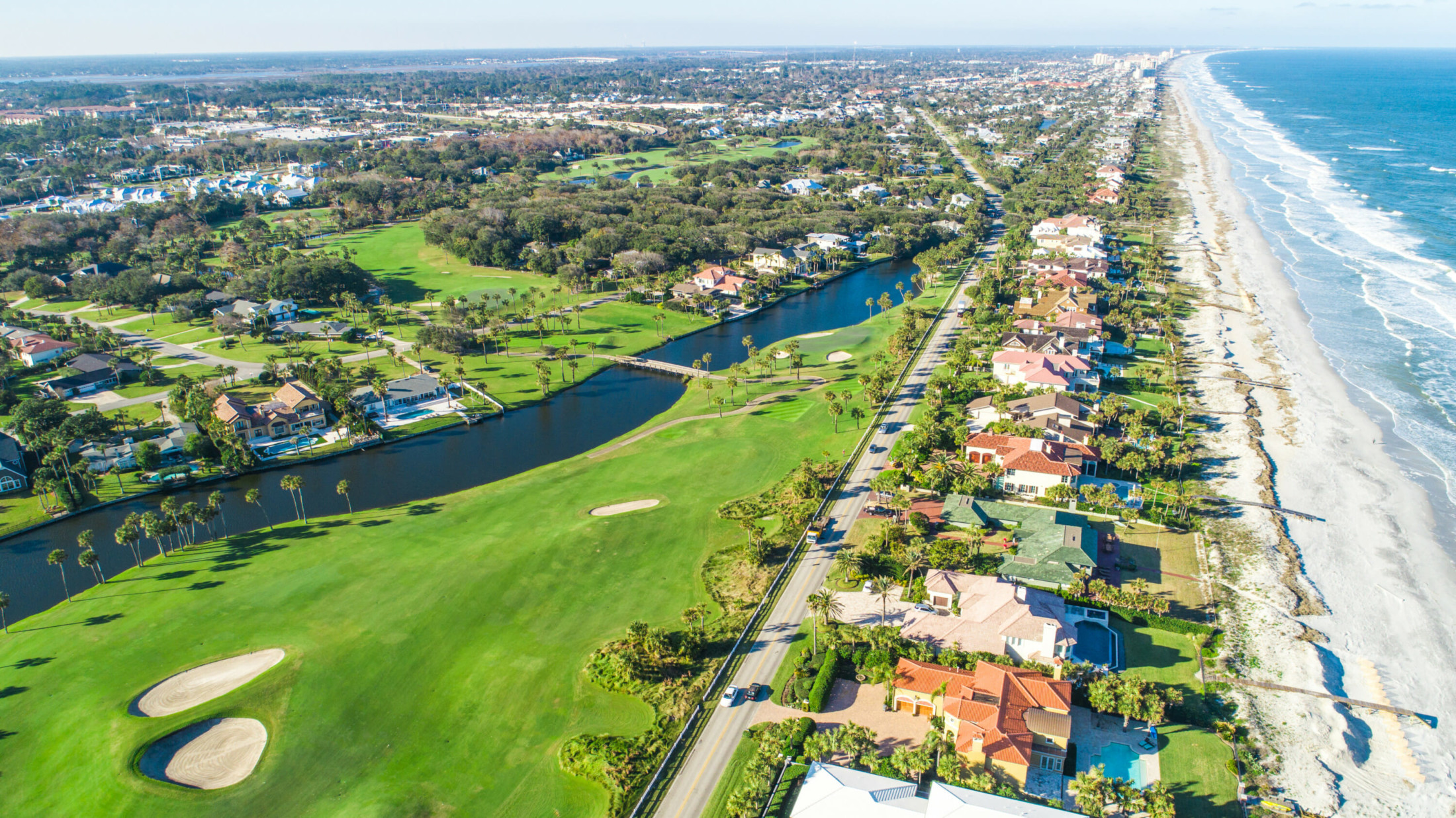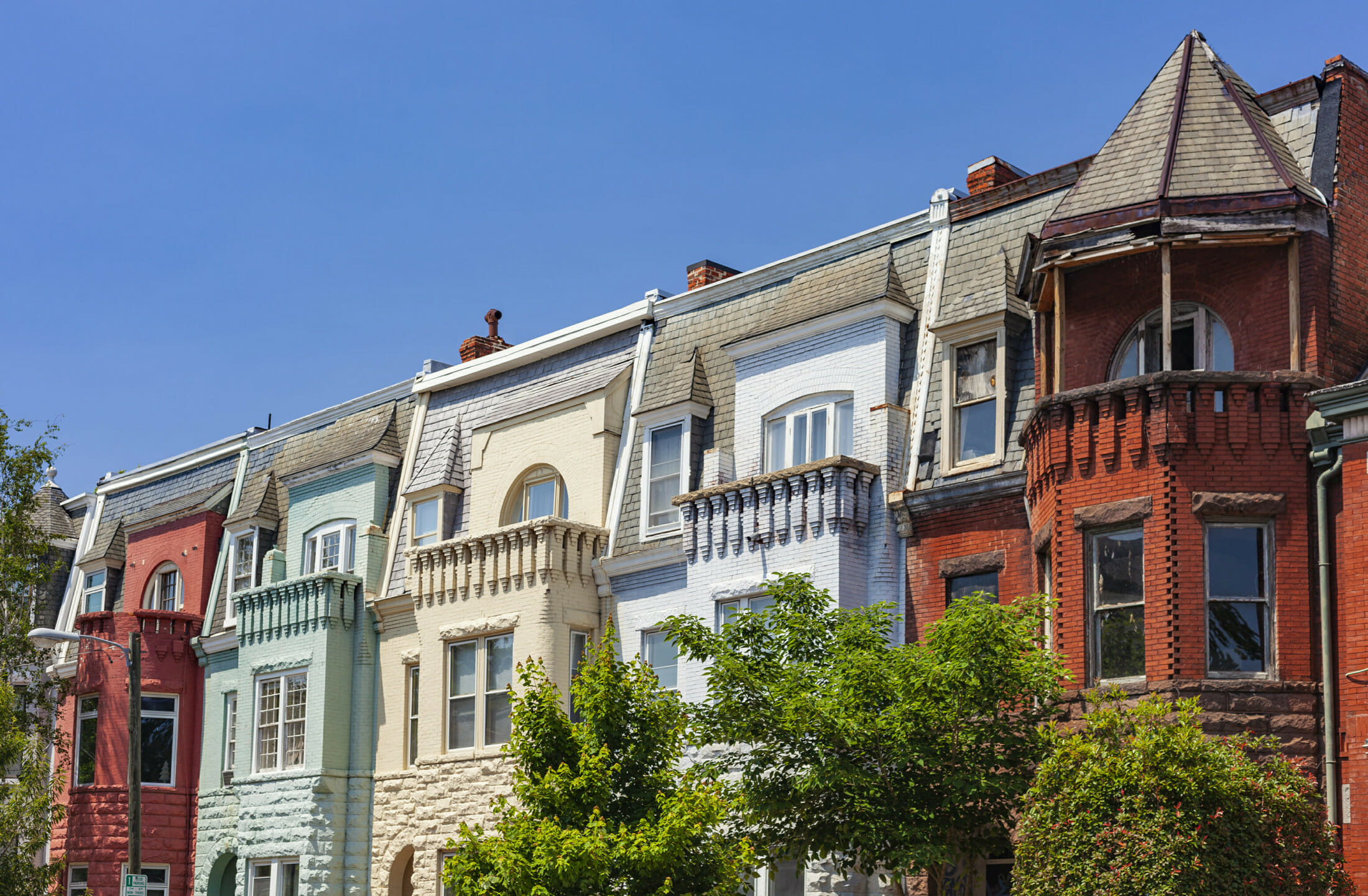Wondering which real estate markets investors are watching in 2022? Read our latest post: 60 Up-and-Coming Real Estate Markets Where Rental Investors & Property Managers Can Grow in 2022
In the throes of the Great Recession and the subsequent recovery, large metropolises like New York City and San Francisco saw an influx of new residents. Mega-cities with strong economies were the first to rebound from the downturn, making them attractive to those seeking well-paying jobs and vibrant surroundings.
Chart of Accounts
Want clearer, cleaner books? What about a more useful view into your properties or just easier accounting in general?
Get the GuideSince 2016, however, a new migration trend has emerged: Residents in expensive, overheated primary markets have their eye on thriving secondary markets—and some are making the move to these small cities and satellite towns. Over the next 5 years, PwC projects that the populations of New York City, Chicago, and Los Angeles will grow at a rate of just 0.2%; while Phoenix, Charleston, and Boise will increase at the significantly faster rate of 1.6%. Much of the migration is from the coasts to the middle of the country, where job and population growth are booming, and a lower cost of living means that residents’ and investors’ dollars go significantly farther.
So, which secondary markets will attract residents’ interest in the year ahead—and how can investors and property managers stay a step ahead of this trend? We evaluated hundreds of cities across the country to form our list of 50 secondary markets to watch in 2019. We utilized a range of measures that reflect qualities that appeal to residents and investors, from growth in job opportunities and property values to cost of living indexes and rent-to-income ratios. The cities that we’ve selected are those that balance projected growth for investors with affordability for residents—a necessary combination for sustainable growth.
Up-and-Coming Real Estate Markets to Watch in 2019
Tier I Cities
Atlanta, GA | Austin, TX | Boise, ID | Charlotte, NC
Clearwater, FL | Columbus, OH | Dallas, TX | Denver, CO
Fort Worth, TX | Las Vegas, NV | Nashville, TN | Orlando, FL
Phoenix, AZ | Sacramento, CA | Salt Lake City, UT | San Antonio, TX
San Diego, CA | San Jose, CA | St. Petersburg, FL | Tampa, FL
Compared to the rest of the country, the emerging real estate markets that we’ve named our best bets for growth in 2019 are:
- Gaining residents twice as fast
- Gaining jobs more than twice as fast
- 4 years younger on average
- Seeing home values grow 50% faster
- Staying affordable for residents—the average cost of living index is on par with the national average
- Seeing 20% faster rent growth than the rest of the country—enough to help property managers and owners turn a profit, but not enough to scare renters into moving or buying homes at a faster rate than usual
- Located largely in the southern half of the country, particularly Florida and Texas
Atlanta, Georgia

Atlanta Real Estate Market Statistics
- Metropolitan statistical area: Atlanta-Sandy Springs-Roswell, GA
- Population: 486,290 – 38ᵗʰ largest U.S. city (Wikipedia – 2017 estimate)
- 5-year projected population growth: 1.3% (PwC, 2018 – U.S. average is 0.7%)
- Median age: 33 years old (City Data, 2016 – U.S. median is 38)
- Median household income: $53,843 (City Data, 2016 – U.S. median was $57,617)
- 5-year projected employment growth: 1.0% (PwC, 2018 – U.S. average is 0.6%)
- Cost of living index: 98.7 (City Data, 2016 – U.S. average is 100)
- Rent-to-household-income ratio: 22.1% (PwC – less than 30% is ideal)
- Median 1-bedroom rent: $1029 (Rentonomics, 2018 – U.S. median is $743)
- Year-over-year rent growth: 1.5% (Rentonomics, 2018 – U.S. average is 1.5%)
- Median single-family home sale price: $224,100 (NAR, Q3 2018 – U.S. median is $266,900)
- Year-over-year home sale price growth: 9.7% (NAR, Q3 2018 – U.S. median is 4.8%)
Expert Opinions on the Atlanta Real Estate Market
- Attom Data: Best Single-Family Rental Growth Markets
- Forbes: Where to Invest in Housing in 2018 (#7)
- GOBankingRates: 20 Best Cities to Own Investment Property (#20)
- Mashvisor: Where to Invest in 2018 (#21)
- PwC/ULI: Markets to Watch in 2019 – Overall Real Estate Prospects (#11), Investor Demand (#13), Development Opportunity (#10)
- RealPage: Annual Rent Growth Leaders (#10)
- Realtor.com: Hottest Real Estate Markets in 10/2018 (#130)
- Redfin: Top 10 Metros That People Are Moving To (#3)
- RentCafe: Largest YoY Rent Growth
- Rentonomics: Biggest YoY Rent Growth (#623)
- USA Today: Fastest-Growing Housing Markets (#13)
- U.S. News: Best Places to Live (#47)
- WalletHub: Fastest-Growing Large Cities (#10)
- Zillow: Hottest Real Estate Markets in 2018 – Largest YoY Rent Increases, Largest YoY Home Value Growth
Austin, Texas

Austin Real Estate Market Statistics
- Metropolitan statistical area: Austin-Round Rock, TX
- Population: 950,715 – 11ᵗʰ largest U.S. city (Wikipedia – 2017 estimate)
- 5-year projected population growth: 2.3% (PwC, 2018 – U.S. average is 0.7%)
- Median age: 32.7 years old (City Data, 2016 – U.S. median is 38)
- Median household income: $66,697 (City Data, 2016 – U.S. median was $57,617)
- 5-year projected employment growth: 2.0% (PwC, 2018 – U.S. average is 0.6%)
- Cost of living index: 95.6 (City Data, 2016 – U.S. average is 100)
- Rent-to-household-income ratio: 19.4% (PwC, 2018 – less than 30% is ideal)
- Median 1-bedroom rent: $1154 (Rentonomics, 2018 – U.S. median is $743)
- Year-over-year rent growth: 2.3% (Rentonomics, 2018 – U.S. average is 1.5%)
- Median single-family home sale price: $318,200 (NAR, Q3 2018 – U.S. median is $266,900)
- Year-over-year home sale price growth: 7.4% (NAR, Q3 2018 – U.S. median is 4.8%)
Expert Opinions on the Austin Real Estate Market
- Business Insider: Best U.S. Cities for Finding a Job in 2018 (#11)
- Forbes: Fastest-Growing Cities in 2018 (#8)
- GOBankingRates: 20 Best Cities to Own Investment Property (#13)
- Mashvisor: Where to Invest in 2018 (#20)
- PwC/ULI: Markets to Watch in 2019 – Overall Real Estate Prospects (#6), Investor Demand (#4), Development Opportunity (#30)
- Realtor.com: Hottest Real Estate Markets in 10/2018 (#140)
- Redfin: Top 10 Metros That People Are Moving To (#6)
- U.S. News: Best Places to Live (#1), 25 Best Places People Are Moving to in 2018 (#4)
- WalletHub: Fastest-Growing Large Cities (#1)
- Zillow: Hottest Real Estate Markets in 2018
- Zumper: Greatest YoY Rent Growth
For more insights on the Austin rental market, check out our in-depth blog post on South Central Real Estate Market Trends!
Boise, Idaho

Boise Real Estate Market Statistics
- Metropolitan statistical area: Boise City, ID
- Population: 226,570 – 98ᵗʰ largest U.S. city (Wikipedia – 2017 estimate)
- 5-year projected population growth: 1.6% (PwC, 2018 – U.S. average is 0.7%)
- Median age: 35.3 years old (City Data, 2016 – U.S. median is 38)
- Median household income: $55,199 (City Data, 2016 – U.S. median was $57,617)
- 5-year projected employment growth: 1.3% (PwC, 2018 – U.S. average is 0.6%)
- Cost of living index: 92.1 (City Data, 2016 – U.S. average is 100)
- Rent-to-household-income ratio: 16.9% (PwC, 2018 – less than 30% is ideal)
- Median 1-bedroom rent: $715 (Rentonomics, 2018 – U.S. median is $743)
- Year-over-year rent growth: 2.2% (Rentonomics, 2018 – U.S. average is 1.5%)
- Median single-family home sale price: $274,700 (NAR, Q3 2018 – U.S. median is $266,900)
- Year-over-year home sale price growth: 18.3% (NAR, Q3 2018 – U.S. median is 4.8%)
Expert Opinions on the Boise Real Estate Market
- Forbes: Fastest-Growing Cities in 2018 (#1), Best Midsize Cities for Jobs (#3)
- GOBankingRates: 20 Best Cities to Own Investment Property (#17)
- Kiplinger: Satellite Cities Poised to Thrive in 2018
- PwC/ULI: Markets to Watch in 2019 – Overall Real Estate Prospects (#51); Investor Demand (#58); Development Opportunity (#44)
- RealPage: Secondary/Tertiary Rent Growth Leaders (#7)
- Realtor.com: Hottest Real Estate Markets in 10/2018 (#9), Surprising Cities with Soaring Home Prices (#8)
- RentCafe: Largest YoY Rent Growth
- Rentonomics: Biggest YoY Rent Growth (#364)
- USA Today: Fastest-Growing Housing Markets (#3), Top 10 Housing Markets in the U.S.
- U.S. News: Best Places to Live (#23), 25 Places People Are Moving to in 2018 (#17)
- WalletHub: Fastest-Growing Mid-Sized Cities (#94)
- Zumper: Greatest YoY Rent Growth
Charlotte, North Carolina

Charlotte Real Estate Market Statistics
- Metropolitan statistical area: Charlotte-Concord-Gastonia, NC-SC
- Population: 859,035 – 17ᵗʰ largest U.S. city (Wikipedia – 2017 estimate)
- 5-year projected population growth: 1.5% (PwC, 2018 – U.S. average is 0.7%)
- Median age: 34 years old (City Data, 2016 – U.S. median is 38)
- Median household income: $61,017 (City Data, 2016 – U.S. median was $57,617)
- 5-year projected employment growth: 1.3% (PwC, 2018 – U.S. average is 0.6%)
- Cost of living index: 92.9 (City Data, 2016 – U.S. average is 100)
- Rent-to-household-income ratio: 20.6% (PwC, 2018 – less than 30% is ideal)
- Median 1-bedroom rent: $961 (Rentonomics, 2018 – U.S. median is $743)
- Year-over-year rent growth: 1.4% (Rentonomics, 2018 – U.S. average is 1.5%)
- Median single-family home sale price: $245,000 (NAR, Q3 2018 – U.S. median is $266,900)
- Year-over-year home sale price growth: 5.1% (NAR, Q3 2018 – U.S. median is 4.8%)
Expert Opinions on the Charlotte Real Estate Market
- Forbes: Fastest-Growing Cities in 2018 (#19), Where to Invest in Housing in 2018 (#16)
- GOBankingRates: 20 Best Cities to Own Investment Property (#8)
- PwC/ULI: Markets to Watch in 2019 – Overall Real Estate Prospects (#9); Investor Demand (#15); Development Opportunity (#5)
- Realtor.com: Hottest Real Estate Markets in 10/2018 (#58), 10 Surprising Cities with Skyrocketing Home Values (#3)
- RentCafe: Largest YoY Rent Growth
- Rentonomics: Fastest YoY Rent Growth
- U.S. News: Best Places to Live (#22), 25 Places People Are Moving To in 2018 (#13)
- WalletHub: Fastest-Growing Large Cities (#4)
- Zillow: Hottest Real Estate Markets in 2018 – Largest YoY Home Value Growth
Clearwater, Florida

Clearwater Real Estate Market Statistics
- Metropolitan statistical area: Tampa-St. Petersburg-Clearwater, FL
- Population: 115,513 – 245ᵗʰ largest U.S. city (Wikipedia – 2017 estimate)
- Median age: 44 years old (City Data, 2016 – U.S. median is 38)
- Median household income: $41,844 (City Data, 2016 – U.S. median was $57,617)
- Cost of living index: 96.4 (City Data, 2016 – U.S. average is 100)
- Median 1-bedroom rent: $954 (Rentonomics, 2018 – U.S. median is $743)
- Year-over-year rent growth: 2.1% (Rentonomics, 2018 – U.S. average is 1.5%)
- Median single-family home sale price: $236,000 (NAR, Q3 2018 – U.S. median is $266,900)
- Year-over-year home sale price growth: 4.9% (NAR, Q3 2018 – U.S. median is 4.8%)
Expert Opinions on the Clearwater Real Estate Market
- Attom Data: Best Single-Family Rental Growth Markets
- Forbes: Fastest-Growing Cities in 2018 (#23)
- PwC/ULI: Markets to Watch in 2019 – Overall Real Estate Prospects (#10); Top 20 Best Cities for Multifamily Property Investments (#10); Investor Demand (#24); Development Opportunity (#12)
- Realtor.com: Hottest Real Estate Markets in 10/2018 (#56)
- RentCafe: Largest YoY Rent Growth
- Rentonomics: Biggest YoY Rent Growth (#313)
- WalletHub: Fastest-Growing Mid-Sized Cities (#80)
Columbus, Ohio

Columbus Real Estate Market Statistics
- Metropolitan statistical area: Columbus, OH
- Population: 879,170 – 14ᵗʰ largest U.S. city (Wikipedia – 2017 estimate)
- 5-year projected population growth: 0.8% (PwC, 2018 – U.S. average is 0.7%)
- Median age: 32.3 years old (City Data, 2016 – U.S. median is 38)
- Median household income: $49,062 (City Data, 2016 – U.S. median was $57,617)
- 5-year projected employment growth: 0.7% (PwC, 2018 – U.S. average is 0.6%)
- Cost of living index: 95.7 (City Data, 2016 – U.S. average is 100)
- Rent-to-household-income ratio: 17.6% (PwC, 2018 – less than 30% is ideal)
- Median 1-bedroom rent: $740 (Rentonomics, 2018 – U.S. median is $743)
- Year-over-year rent growth: 0.8% (Rentonomics, 2018 – U.S. average is 1.5%)
- Median single-family home sale price: $207,600 (NAR, Q3 2018 – U.S. median is $266,900)
- Year-over-year home sale price growth: 7.1% (NAR, Q3 2018 – U.S. median is 4.8%)
- Multifamily property buy/hold/sell recommendations: 50% of investors say buy, 25% say hold, 25% say sell (PwC/ULI)
Expert Opinions on the Columbus Real Estate Market
- Forbes: Where to Invest in Housing in 2018 (#20)
- GOBankingRates: 20 Best Cities to Own Investment Property (#5)
- PwC/ULI: Markets to Watch in 2019 – Overall Real Estate Prospects (#23); Top 20 Best Cities for Multifamily Property Investments (#19); Investor Demand (#35); Development Opportunity (#6)
- Realtor.com: Hottest Real Estate Markets in 10/2018 (#5), 10 Surprising Cities with Skyrocketing Home Values (#9)
- RentCafe: Largest YoY Rent Growth
- USA Today: Top 10 Housing Markets in the U.S. (Worthington, OH)
- U.S. News: Best Places to Live (#36)
- WalletHub: Fastest-Growing Large Cities (#25)
- Zillow: Hottest Real Estate Markets in 2018 – Largest YoY Rent Increases, Largest YoY Home Value Growth
- Zumper: Greatest YoY Rent Growth
Dallas, Texas

Dallas Real Estate Market Statistics
- Metropolitan statistical area: Dallas-Fort Worth-Arlington, TX
- Population: 1,341,075 – 9ᵗʰ largest U.S. city (Wikipedia – 2017 estimate)
- 5-year projected population growth: 1.7% (PwC, 2018 – U.S. average is 0.7%)
- Median age: 32.7 years old (City Data, 2016 – U.S. median is 38)
- Median household income: $47,243 (City Data, 2016 – U.S. median was $57,617)
- 5-year projected employment growth: 1.4% (PwC, 2018 – U.S. average is 0.6%)
- Cost of living index: 94.1 (City Data, 2016 – U.S. average is 100)
- Rent-to-household-income ratio: 21.2% (PwC, 2018 – less than 30% is ideal)
- Median 1-bedroom rent: $894 (Rentonomics, 2018 – U.S. median is $743)
- Year-over-year rent growth: 0.6% (Rentonomics, 2018 – U.S. average is 1.5%)
- Median single-family home sale price: $262,100 (NAR, Q3 2018 – U.S. median is $266,900)
- Year-over-year home sale price growth: 5.3% (NAR, Q3 2018 – U.S. median is 4.8%)
Expert Opinions on the Dallas Real Estate Market
- Attom Data: Best Single-Family Rental Growth Markets
- Forbes: Fastest-Growing Cities in 2018
- PwC/ULI: Markets to Watch in 2019 – Overall Real Estate Prospects (#1); Investor Demand (#11); Development Opportunity (#9)
- Realtor.com: Hottest Real Estate Markets in 10/2018 (#30)
- Redfin: Top 10 Metros That People Are Moving To (#7)
- RentCafe: Largest YoY Rent Growth
- U.S. News: Best Places to Live (#18), 25 Places People Are Moving To in 2018 (#24)
- WalletHub: Fastest-Growing Large Cities (#17)
- Zillow: Hottest Real Estate Markets in 2018 – Largest YoY Home Value Growth
For more insights on the Dallas rental market, check out our in-depth blog post on South Central Real Estate Market Trends!
Denver, Colorado

Denver Real Estate Market Statistics
- Metropolitan statistical area: Denver-Aurora-Lakewood, CO
- Population: 704,621 – 19ᵗʰ largest U.S. city (Wikipedia – 2017 estimate)
- 5-year projected population growth: 1.3% (PwC, 2018 – U.S. average is 0.7%)
- Median age: 34.4 years old (City Data, 2016 – U.S. median is 38)
- Median household income: $61,105 (City Data, 2016 – U.S. median was $57,617)
- 5-year projected employment growth: 1.2% (PwC, 2018 – U.S. average is 0.6%)
- Cost of living index: 112.2 (City Data, 2016 – U.S. average is 100)
- Rent-to-household-income ratio: 21.6% (PwC, 2018 – less than 30% is ideal)
- Median 1-bedroom rent: $1063 (Rentonomics, 2018 – U.S. median is $743)
- Year-over-year rent growth: 1.2% (Rentonomics, 2018 – U.S. average is 1.5%)
- Median single-family home sale price: $450,100 (NAR, Q3 2018 – U.S. median is $266,900)
- Year-over-year home sale price growth: 7.7% (NAR, Q3 2018 – U.S. median is 4.8%)
Expert Opinions on the Denver Real Estate Market
- GOBankingRates: 20 Best Cities to Own Investment Property (#19)
- Mashvisor: Where to Invest in 2018 (#15)
- PwC/ULI – Markets to Watch in 2019: Overall Real Estate Prospects (#8); Investor Demand (#3); Development Opportunity (#25)
- Realtor.com: Hottest Real Estate Markets in 10/2018 (#77), Most Profitable Housing Markets (#6)
- RentCafe: Largest YoY Rent Growth
- U.S. News: Best Places to Live (#3), Best Places People Are Moving to in 2018 (#20)
- WalletHub: Fastest-Growing Large Cities (#5)
- Zillow: Hottest Real Estate Markets in 2018
- Zumper: Greatest YoY Rent Growth
Fort Worth, Texas

Fort Worth Real Estate Market Statistics
- Metropolitan statistical area: Dallas-Fort Worth-Arlington, TX
- Population: 874,168 – 15ᵗʰ largest U.S. city (Wikipedia – 2017 estimate)
- 5-year projected population growth: 1.7% (PwC, 2018 – U.S. average is 0.7%)
- Median age: 32.4 years old (City Data, 2016 – U.S. median is 38)
- Median household income: $56,428 (City Data, 2016 – U.S. median was $57,617)
- 5-year projected employment growth: 1.4% (PwC, 2018 – U.S. average is 0.6%)
- Cost of living index: 93.9 (City Data, 2016 – U.S. average is 100)
- Rent-to-household-income ratio: 21.2% (PwC, 2018 – less than 30% is ideal)
- Median 1-bedroom rent: $923 (Rentonomics, 2018 – U.S. median is $743)
- Year-over-year rent growth: 1.0% (Rentonomics, 2018 – U.S. average is 1.5%)
- Median single-family home sale price: $262,100 (NAR, Q3 2018 – U.S. median is $266,900)
- Year-over-year home sale price growth: 5.3% (NAR, Q3 2018 – U.S. median is 4.8%)
Expert Opinions on the Fort Worth Real Estate Market
- Attom Data: Best Single-Family Rental Growth Markets
- Forbes: Fastest-Growing Cities in 2018 (#5), Where to Invest in Housing in 2018 (#9)
- PwC/ULI: Markets to Watch in 2019 – Overall Real Estate Prospects (#1), Investor Demand (#11), Development Opportunity (#9)
- Realtor.com: Hottest Real Estate Markets in 10/2018 (#30)
- RentCafe: Largest YoY Rent Growth
- USA Today: Top 10 Housing Markets in the U.S. (Watauga, TX)
- U.S. News: Best Places to Live (#18), 25 Places People Are Moving to in 2018 (#24)
- WalletHub: Fastest-Growing Large Cities (#6)
- Zillow: Hottest Real Estate Markets in 2018 – Largest YoY Home Value Growth
- Zumper: Greatest YoY Rent Growth (#43)
For more insights on the Fort Worth rental market, check out our in-depth blog post on South Central Real Estate Market Trends!
Las Vegas, Nevada

Las Vegas Real Estate Market Statistics
- Metropolitan statistical area: Las Vegas-Henderson-Paradise, NV
- Population: 641,676 – 28ᵗʰ largest U.S. city (Wikipedia – 2017 estimate)
- 5-year projected population growth: 1.4% (PwC, 2018 – U.S. average is 0.7%)
- Median age: 38.1 years old (City Data, 2016 – U.S. median is 38)
- Median household income: $51,115 (City Data, 2016 – U.S. median was $57,617)
- 5-year projected employment growth: 1.7% (PwC, 2018 – U.S. average is 0.6%)
- Cost of living index: 96.4 (City Data, 2016 – U.S. average is 100)
- Rent-to-household-income ratio: 22.4% (PwC, 2018 – less than 30% is ideal)
- Median 1-bedroom rent: $927 (Rentonomics, 2018 – U.S. median is $743)
- Year-over-year rent growth: 3.6% (Rentonomics, 2018 – U.S. average is 1.5%)
- Median single-family home sale price: $294,600 (NAR, Q3 2018 – U.S. median is $266,900)
- Year-over-year home sale price growth: 12.6% (NAR, Q3 2018 – U.S. median is 4.8%)
- Multifamily property buy/hold/sell recommendations: 59% of investors say buy, 21% say hold, 21% say sell (PwC/ULI)
Expert Opinions on the Las Vegas Real Estate Market
- Forbes: Fastest-Growing Cities in 2018 (#6)
- GOBankingRates: 20 Best Cities to Own Investment Property (#11)
- PwC/ULI: Markets to Watch in 2019 – Overall Real Estate Prospects (#42), Top 20 Best Cities for Multifamily Property Investments (#3), Investor Demand (#49), Development Opportunity (#37)
- RealPage: Annual Rent Growth Leaders (#1)
- Realtor.com: Hottest Real Estate Markets in 10/2018 (#27)
- Redfin: Top 10 Metros That People Are Moving To (#4)
- RentCafe: Largest YoY Rent Growth
- Rentonomics: Biggest YoY Rent Growth (#178)
- USA Today: Fastest-Growing Housing Markets (#2)
- U.S. News: Best Places to Live (#80); 25 Places People Are Moving to in 2018 (#18)
- WalletHub: Fastest-Growing Large Cities (#16)
- Zillow: Hottest Real Estate Markets in 2018 – Largest YoY Rent Increases, Largest YoY Home Value Growth
- Zumper: Greatest YoY Rent Growth (#57)
Nashville, Tennessee

Nashville Real Estate Market Statistics
- Metropolitan statistical area: Nashville-Davidson-Murfreesboro-Franklin, TN
- Population: 667,560 – 24ᵗʰ largest U.S. city (Wikipedia – 2017 estimate)
- 5-year projected population growth: 1.4% (PwC, 2018 – U.S. average is 0.7%)
- Median age: 34 years old (City Data, 2016 – U.S. median is 38)
- Median household income: $54,310 (City Data, 2016 – U.S. median was $57,617)
- 5-year projected employment growth: 1.3% (PwC, 2018 – U.S. average is 0.6%)
- Cost of living index: 90 (City Data, 2016 – U.S. average is 100)
- Rent-to-household-income ratio: 21.7% (PwC, 2018 – less than 30% is ideal)
- Median 1-bedroom rent: $917 (Rentonomics, 2018 – U.S. median is $743)
- Year-over-year rent growth: -0.2% (Rentonomics, 2018 – U.S. average is 1.5%)
- Median single-family home sale price: $262,600 (NAR, Q3 2018 – U.S. median is $266,900)
- Year-over-year home sale price growth: 12.1% (NAR, Q3 2018 – U.S. median is 4.8%)
Expert Opinions on the Nashville Real Estate Market
- Forbes: Fastest-Growing Cities in 2018 (#7); Where to Invest in Housing in 2018 (#6)
- PwC/ULI: Markets to Watch in 2019 – Overall Real Estate Prospects (#5); Investor Demand (#6); Development Opportunity (#20)
- Realtor.com: Hottest Real Estate Markets in 10/2018 (#37); Most Profitable Housing Markets (#9); 10 Surprising Cities with Skyrocketing Home Values (#10)
- Redfin: Top 10 Metros That People Are Moving To (#10)
- U.S. News: Best Places to Live (#11); 25 Places People Are Moving To in 2018 (#11)
- WalletHub: Fastest-Growing Large Cities (#8)
- Zumper: Greatest YoY Rent Growth
For more insights on the Nashville rental market, check out our in-depth blog post on South Central Real Estate Market Trends!
Orlando, Florida

Orlando Real Estate Market Statistics
- Metropolitan statistical area: Orlando-Kissimmee-Sanford, FL
- Population: 280,257 – 72nd largest U.S. city (Wikipedia – 2017 estimate)
- 5-year projected population growth: 1.7% (PwC, 2018 – U.S. average is 0.7%)
- Median age: 33.1 years old (City Data, 2016 – U.S. median is 38)
- Median household income: $46,761 (City Data, 2016 – U.S. median was $57,617)
- 5-year projected employment growth: 1.6% (PwC, 2018 – U.S. average is 0.6%)
- Cost of living index: 93.3 (City Data, 2016 – U.S. average is 100)
- Rent-to-household-income ratio: 26.7% (PwC, 2018 – less than 30% is ideal)
- Median 1-bedroom rent: $1063 (Rentonomics, 2018 – U.S. median is $743)
- Year-over-year rent growth: 4.4% (Rentonomics, 2018 – U.S. average is 1.5%)
- Median single-family home sale price: $266,000 (NAR, Q3 2018 – U.S. median is $266,900)
- Year-over-year home sale price growth: 7.3% (NAR, Q3 2018 – U.S. median is 4.8%)
- Multifamily property buy/hold/sell recommendations: 58% of investors say buy, 24% say hold, 18% say sell (PwC/ULI)
Expert Opinions on the Orlando Real Estate Market
- Business Insider: Best U.S. Cities for Finding a Job (#13)
- Forbes: Fastest-Growing Cities in 2018 (#4); Where to Invest in Housing in 2018 (#1)
- GOBankingRates: 20 Best Cities to Own Investment Property (#2)
- PwC/ULI: Overall Real Estate Prospects – Overall Real Estate Prospects (#4); Top 20 Best Cities for Multifamily Property Investments (#4); Investor Demand (#17); Development Opportunity (#11)
- RealPage: Annual Rent Growth Leaders (#2)
- Realtor.com: Hottest Real Estate Markets in 10/2018 (#66)
- RentCafe: Largest YoY Rent Growth
- Rentonomics: Biggest YoY Rent Growth (#76)
- U.S. News: Best Places to Live (#78); 25 Places People Are Moving to in 2018 (#5)
- WalletHub: Fastest-Growing Mid-Sized Cities (#21)
- Zillow: Hottest Real Estate Markets in 2018 – Largest YoY Rent Increases; Largest YoY Home Value Growth
- Zumper: Greatest YoY Rent Growth
Phoenix, Arizona

Phoenix Real Estate Market Statistics
- Metropolitan statistical area: Phoenix-Mesa-Scottsdale, AZ
- Population: 1,626,078 – 3rd largest U.S. city (Wikipedia – 2017 estimate)
- 5-year projected population growth: 1.6% (PwC, 2018 – U.S. average is 0.7%)
- Median age: 33.4 years old (City Data, 2016 – U.S. median is 38)
- Median household income: $52,062 (City Data, 2016 – U.S. median was $57,617)
- 5-year projected employment growth: 1.6% (PwC, 2018 – U.S. average is 0.6%)
- Cost of living index: 93.7 (City Data, 2016 – U.S. average is 100)
- Rent-to-household-income ratio: 20.2% (PwC, 2018 – less than 30% is ideal)
- Median 1-bedroom rent: $846 (Rentonomics, 2018 – U.S. median is $743)
- Year-over-year rent growth: 3.0% (Rentonomics, 2018 – U.S. average is 1.5%)
- Median single-family home sale price: $272,700 (NAR, Q3 2018 – U.S. median is $266,900)
- Year-over-year home sale price growth: 9.6% (NAR, Q3 2018 – U.S. median is 4.8%)
Expert Opinions on the Phoenix Real Estate Market
- Forbes: Fastest-Growing Cities in 2018 (#11)
- GOBankingRates: 20 Best Cities to Own Investment Property (#7)
- PwC/ULI: Markets to Watch in 2019 – Overall Real Estate Prospects (#29); Investor Demand (#28); Development Opportunity (#29)
- RealPage: Annual Rent Growth Leaders (#3)
- Realtor.com: Hottest Real Estate Markets in 10/2018 (#40)
- Redfin: Top 10 Metros That People Are Moving To (#1)
- RentCafe: Largest YoY Rent Growth
- Rentonomics: Biggest YoY Rent Growth (#591)
- USA Today: Fastest-Growing Housing Markets (#24)
- U.S. News: Best Places to Live (#19); 25 Places People Are Moving to in 2018 (#22)
- WalletHub: Fastest-Growing Large Cities (#18)
- Zillow: Hottest Real Estate Markets in 2018 – Largest YoY Rent Increases
- Zumper: Greatest YoY Rent Growth (#55)
Sacramento, California

Sacramento Real Estate Market Statistics
- Metropolitan statistical area: Sacramento-Roseville-Arden-Arcade, CA
- Population: 501,901 – 35ᵗʰ largest U.S. city (Wikipedia – 2017 estimate)
- 5-year projected population growth: 1.3% (PwC, 2018 – U.S. average is 0.7%)
- Median age: 34.7 years old (City Data, 2016 – U.S. median is 38)
- Median household income: $55,187 (City Data, 2016 – U.S. median was $57,617)
- 5-year projected employment growth: 1.3% (PwC, 2018 – U.S. average is 0.6%)
- Cost of living index: 100.4 (City Data, 2016 – U.S. average is 100)
- Rent-to-household-income ratio: 23.4% (PwC, 2018 – less than 30% is ideal)
- Median 1-bedroom rent: $955 (Rentonomics, 2018 – U.S. median is $743)
- Year-over-year rent growth: 1.8% (Rentonomics, 2018 – U.S. average is 1.5%)
- Median single-family home sale price: $370,000 (NAR, Q3 2018 – U.S. median is $266,900)
- Year-over-year home sale price growth: 5.7% (NAR, Q3 2018 – U.S. median is 4.8%)
- Multifamily property buy/hold/sell recommendations: 58% of investors say buy, 27% say hold, 15% say sell (PwC/ULI)
Expert Opinions on the Sacramento Real Estate Market
- Forbes: Where to Invest in Housing in 2018 (#10)
- Mashvisor: Where to Invest in 2018 (#18)
- PwC/ULI: Markets to Watch in 2019 – Overall Real Estate Prospects (#57); Top 20 Best Cities for Multifamily Property Investments (#6); Investor Demand (#59); Development Opportunity (#39)
- RealPage: Annual Rent Growth Leaders (#12)
- Realtor.com: Hottest Real Estate Markets in 10/2018 (#16)
- Redfin: Top 10 Metros That People Are Moving To (#2)
- RentCafe: Largest YoY Rent Growth
- Rentonomics: Biggest YoY Rent Growth (#351)
- USA Today: Fastest-Growing Housing Markets (#23); Best Cities for Job Seekers (#7)
- U.S. News: Best Places to Live (#92)
- WalletHub: Fastest-Growing Large Cities (#28)
- Zillow: Hottest Real Estate Markets in 2018 – Largest YoY Rent Increases
- Zumper: Greatest YoY Rent Growth
Salt Lake City, Utah

Salt Lake City Real Estate Market Statistics
- Metropolitan statistical area: Salt Lake City, UT
- Population: 200,544 – 116ᵗʰ largest U.S. city (Wikipedia – 2017 estimate)
- 5-year projected population growth: 1.4% (PwC, 2018 – U.S. average is 0.7%)
- Median age: 32.7 years old (City Data, 2016 – U.S. median is 38)
- Median household income: $56,994 (City Data, 2016 – U.S. median was $57,617)
- 5-year projected employment growth: 1.4% (PwC, 2018 – U.S. average is 0.6%)
- Cost of living index: 92.4 (City Data, 2016 – U.S. average is 100)
- Rent-to-household-income ratio: 17.2% (PwC, 2018 – less than 30% is ideal)
- Median 1-bedroom rent: $860 (Rentonomics, 2018 – U.S. median is $743)
- Year-over-year rent growth: 1.6% (Rentonomics, 2018 – U.S. average is 1.5%)
- Median single-family home sale price: $322,300 (NAR, Q3 2018 – U.S. median is $266,900)
- Year-over-year home sale price growth: 9.4% (NAR, Q3 2018 – U.S. median is 4.8%)
- Multifamily property buy/hold/sell recommendations: 61% of investors say buy, 29% say hold, 11% say sell (PwC/ULI)
Expert Opinions on the Salt Lake City Real Estate Market
- Business Insider: Best U.S. Cities for Finding a Job (#18)
- Forbes: Fastest-Growing Cities in 2018 (#24)
- PwC/ULI: Markets to Watch in 2019 – Overall Real Estate Prospects (#13); Top 20 Best Cities for Multifamily Property Investments (#2); Investor Demand (#22); Development Opportunity (#23)
- RealPage: Annual Rent Growth Leaders (#8)
- Realtor.com: Hottest Real Estate Markets in 10/2018 (#113)
- RentCafe: Largest YoY Rent Growth
- Rentonomics: Biggest YoY Rent Growth (#139)
- U.S. News: Best Places to Live (#15)
- WalletHub: Fastest-Growing Mid-Sized Cities (#102)
- Zumper: Greatest YoY Rent Growth
San Antonio, Texas

San Antonio Real Estate Market Statistics
- Metropolitan statistical area: San Antonio-New Braunfels, TX
- Population: 1,511,946 – 7ᵗʰ largest U.S. city (Wikipedia – 2017 estimate)
- 5-year projected population growth: 1.7% (PwC, 2018 – U.S. average is 0.7%)
- Median age: 33.5 years old (City Data, 2016 – U.S. median is 38)
- Median household income: $49,268 (City Data, 2016 – U.S. median was $57,617)
- 5-year projected employment growth: 1.3% (PwC, 2018 – U.S. average is 0.6%)
- Cost of living index: 87.5 (City Data, 2016 – U.S. average is 100)
- Rent-to-household-income ratio: 19.3% (PwC, 2018 – less than 30% is ideal)
- Median 1-bedroom rent: $845 (Rentonomics, 2018 – U.S. median is $743)
- Year-over-year rent growth: 1.5% (Rentonomics, 2018 – U.S. average is 1.5%)
- Median single-family home sale price: $231,800 (NAR, Q3 2018 – U.S. median is $266,900)
- Year-over-year home sale price growth: 5.0% (NAR, Q3 2018 – U.S. median is 4.8%)
Expert Opinions on the San Antonio Real Estate Market
- Forbes: Fastest-Growing Cities in 2018 (#21); Where to Invest in Housing in 2018 (#12)
- GOBankingRates: 20 Best Cities to Own Investment Property (#12)
- PwC/ULI: Markets to Watch in 2019 – Overall Real Estate Prospects (#20); Investor Demand (#30); PwC/ULI: Development Opportunity (#3)
- Realtor.com: Hottest Real Estate Markets in 10/2018 (#92)
- RentCafe: Largest YoY Rent Growth
- U.S. News: Best Places to Live (#14); 25 Places People Are Moving to in 2018 (#16)
- WalletHub: Fastest-Growing Large Cities (#14)
- Zillow: Hottest Real Estate Markets in 2018
- Zumper: Greatest YoY Rent Growth
For more insights on the San Antonio rental market, check out our in-depth blog post on South Central Real Estate Market Trends!
San Diego, California

San Diego Real Estate Market Statistics
- Metropolitan statistical area: San Diego-Carlsbad, CA
- Population: 1,419,516 – 8ᵗʰ largest U.S. city (Wikipedia – 2017 estimate)
- 5-year projected population growth: 0.8% (PwC, 2018 – U.S. average is 0.7%)
- Median age: 34.6 years old (City Data, 2016 – U.S. median is 38)
- Median household income: $71,481 (City Data, 2016 – U.S. median was $57,617)
- 5-year projected employment growth: 0.9% (PwC, 2018 – U.S. average is 0.6%)
- Cost of living index: 138 (City Data, 2016 – U.S. average is 100)
- Rent-to-household-income ratio: 28.4% (PwC, 2018 – less than 30% is ideal)
- Median 1-bedroom rent: $1566 (Rentonomics, 2018 – U.S. median is $743)
- Year-over-year rent growth: 0.9% (Rentonomics, 2018 – U.S. average is 1.5%)
- Median single-family home sale price: $650,000 (NAR, Q3 2018 – U.S. median is $266,900)
- Year-over-year home sale price growth: 7.1% (NAR, Q3 2018 – U.S. median is 4.8%)
- Multifamily property buy/hold/sell recommendations: 52% of investors say buy, 39% say hold, 9% say sell (PwC/ULI)
Expert Opinions on the San Diego Real Estate Market
- GOBankingRates: 20 Best Cities to Own Investment Property (#18)
- Mashvisor: Where to Invest in 2018 (#11)
- PwC/ULI: Markets to Watch in 2019 – Overall Real Estate Prospects (#30); Top 20 Best Cities for Multifamily Property Investments (#12); Investor Demand (#26); Development Opportunity (#62)
- RealPage: Annual Rent Growth Leaders (#9)
- Realtor.com: Hottest Real Estate Markets in 10/2018 (#34)
- Redfin: Top 10 Metros That People Are Moving To (#9)
- RentCafe: Largest YoY Rent Growth
- Rentonomics: Biggest YoY Rent Growth (#679)
- USA Today: Best Cities for Job Seekers (#4)
- U.S. News: Best Places to Live (#30)
- WalletHub: Fastest-Growing Large Cities (#32)
- Zillow: Hottest Real Estate Markets in 2018
- Zumper: Greatest YoY Rent Growth
San Jose, California

San Jose Real Estate Market Statistics
- Metropolitan statistical area: San Jose-Sunnyvale-Santa Clara, CA
- Population: 1,035,317 – 10ᵗʰ largest U.S. city (Wikipedia – 2017 estimate)
- 5-year projected population growth: 1.0% (PwC, 2018 – U.S. average is 0.7%)
- Median age: 36.3 years old (City Data, 2016 – U.S. median is 38)
- Median household income: $101,940 (City Data, 2016 – U.S. median was $57,617)
- 5-year projected employment growth: 1.0% (PwC, 2018 – U.S. average is 0.6%)
- Cost of living index: 151.2 (City Data, 2016 – U.S. average is 100)
- Rent-to-household-income ratio: 26.0% (PwC, 2018 – less than 30% is ideal)
- Median 1-bedroom rent: $2102 (Rentonomics, 2018 – U.S. median is $743)
- Year-over-year rent growth: 2.7% (Rentonomics, 2018 – U.S. average is 1.5%)
- Median single-family home sale price: $1,300,000 (NAR, Q3 2018 – U.S. median is $266,900)
- Year-over-year home sale price growth: 11.6% (NAR, Q3 2018 – U.S. median is 4.8%)
Expert Opinions on the San Jose Real Estate Market
- Mashvisor: Where to Invest in 2018 (#7)
- PwC/ULI: Markets to Watch in 2019 – Overall Real Estate Prospects (#26); Investor Demand (#12); Development Opportunity (#58)
- RealPage: Annual Rent Growth Leaders (#5)
- Realtor.com: Hottest Real Estate Markets in 10/2018 (#53); Most Profitable Housing Markets (#4)
- RentCafe: Largest YoY Rent Growth (Santa Clara)
- Rentonomics: Biggest YoY Rent Growth (#593)
- USA Today: Fastest-Growing Housing Markets (#1); Best Cities for Job Seekers (#1)
- U.S. News: Best Places to Live (#17)
- WalletHub: Fastest-Growing Large Cities (#12)
- Zillow: Hottest Real Estate Markets in 2018 – Largest YoY Home Value Growth
- Zumper: Greatest YoY Rent Growth
St. Petersburg, Florida

St. Petersburg Real Estate Market Statistics
- Metropolitan statistical area: Tampa-St. Petersburg-Clearwater, FL
- Population: 263,255 – 79ᵗʰ largest U.S. city (Wikipedia – 2017 estimate)
- 5-year projected population growth: 1.1% (PwC, 2018 – U.S. average is 0.7%)
- Median age: 42.7 years old (City Data, 2016 – U.S. median is 38)
- Median household income: $51,474 (City Data, 2016 – U.S. median was $57,617)
- 5-year projected employment growth: 1.1% (PwC, 2018 – U.S. average is 0.6%)
- Cost of living index: 95.9 (City Data, 2016 – U.S. average is 100)
- Rent-to-household-income ratio: 25.1% (PwC, 2018 – less than 30% is ideal)
- Median 1-bedroom rent: $948 (Rentonomics, 2018 – U.S. median is $743)
- Year-over-year rent growth: 1.7% (Rentonomics, 2018 – U.S. average is 1.5%)
- Median single-family home sale price: $236,000 (NAR, Q3 2018 – U.S. median is $266,900)
- Year-over-year home sale price growth: 4.9% (NAR, Q3 2018 – U.S. median is 4.8%)
- Multifamily property buy/hold/sell recommendations: 53% of investors say buy, 27% say hold, 20% say sell (PwC/ULI)
Expert Opinions on the St. Petersburg Real Estate Market
- Attom Data: Best Single-Family Rental Growth Markets (Tampa-St. Petersburg-Clearwater)
- Forbes: Fastest-Growing Cities in 2018 (#23 – Tampa/St. Petersburg/Clearwater)
- GOBankingRates: 20 Best Cities to Own Investment Property (#10)
- PwC/ULI: Markets to Watch in 2019 – Overall Real Estate Prospects (#10); Top 20 Best Cities for Multifamily Property Investments (#10); Investor Demand (#24); Development Opportunity (#12)
- Realtor.com: Hottest Real Estate Markets in 10/2018 (#56 – Tampa/St. Petersburg/Clearwater)
- RentCafe: Largest YoY Rent Growth
- Rentonomics: Biggest YoY Rent Growth (#486)
- WalletHub: Fastest-Growing Mid-Sized Cities (#71)
- Zumper: Greatest YoY Rent Growth
Tampa, Florida

Tampa Real Estate Market Statistics
- Metropolitan statistical area: Tampa-St. Petersburg-Clearwater, FL
- Population: 385,430 – 52nd largest U.S. city (Wikipedia – 2017 estimate)
- 5-year projected population growth: 1.1% (PwC, 2018 – U.S. average is 0.7%)
- Median age: 36.2 years old (City Data, 2016 – U.S. median is 38)
- Median household income: $50,405 (City Data, 2016 – U.S. median was $57,617)
- 5-year projected employment growth: 1.1% (PwC, 2018 – U.S. average is 0.6%)
- Cost of living index: 96.3 (City Data, 2016 – U.S. average is 100)
- Rent-to-household-income ratio: 25.1% (PwC, 2018 – less than 30% is ideal)
- Median 1-bedroom rent: $1011 (Rentonomics, 2018 – U.S. median is $743)
- Year-over-year rent growth: 2.6% (Rentonomics, 2018 – U.S. average is 1.5%)
- Median single-family home sale price: $236,000 (NAR, Q3 2018 – U.S. median is $266,900)
- Year-over-year home sale price growth: 4.9% (NAR, Q3 2018 – U.S. median is 4.8%)
- Multifamily property buy/hold/sell recommendations: 53% of investors say buy, 27% say hold, 20% say sell (PwC/ULI)
Expert Opinions on the Tampa Real Estate Market
- Attom Data: Best Single-Family Rental Growth Markets
- Business Insider: Best U.S. Cities for Finding a Job (#16)
- Forbes: Fastest-Growing Cities in 2018 (#23)
- GOBankingRates: 20 Best Cities to Own Investment Property (#9)
- PwC/ULI: Markets to Watch in 2019 – Overall Real Estate Prospects (#10); Top 20 Best Cities for Multifamily Property Investments (#10); Investor Demand (#24); Development Opportunity (#12)
- RealPage: Annual Rent Growth Leaders (#6)
- Realtor.com: Hottest Real Estate Markets in 10/2018 (#56)
- RentCafe: Largest YoY Rent Growth
- Rentonomics: Biggest YoY Rent Growth (#206)
- U.S. News: Best Places to Live (#75); 25 Places People Are Moving to in 2018 (#12)
- WalletHub: Fastest-Growing Large Cities (#19)
- Zillow: Hottest Real Estate Markets in 2018 – Largest YoY Rent Increases; Largest YoY Home Value Growth
Up-and-Coming Real Estate Markets to Watch in 2019
Tier II Cities
Anaheim, CA | Arlington, TX | Charleston, SC | Cincinnati, OH
Colorado Springs, CO | Detroit, MI | Durham, NC | Fort Lauderdale, FL
Grand Rapids, MI | Henderson, NV | Houston, TX | Indianapolis, IN
Jacksonville, FL | Kansas City, MO | Long Beach, CA | Louisville, KY
Madison, WI | Miami, FL | Minneapolis, MN | Oakland, CA
Pittsburgh, PA | Portland, OR | Raleigh, NC | Reno, NV | Richmond, VA
Riverside, CA | Scottsdale, AZ | Seattle, WA
Tier II cities are slightly less proven than Tier I cities, but they show highly promising signs of growth for the year ahead. These emerging real estate markets may present an excellent opportunity for investors and homebuyers to get in on the ground floor of next year’s Tier I picks.
In comparison with the rest of the U.S., the cities that we’ve named up-and-coming markets to watch in 2019 are:
- Growing 41% faster than the rest of the country—slower than Tier I cities, but still ahead of the rest of the U.S.
- 4 years younger than the rest of the U.S.—the same as Tier I cities
- Gaining jobs 50% faster than the rest of the country—slower than Tier I cities, but still ahead of the rest of the U.S.
- Seeing home prices grow 20% faster than the rest of the country
- Staying affordable for residents—the average cost of living index is on par with the national average
- Seeing 7% slower rent growth than the national average and 22% slower than Tier I cities, but rents will grow faster as these markets become more established
- Located in the Great Lakes, Pacific Coast, South Atlantic, and Southwestern regions of the country
Anaheim, California

Anaheim Real Estate Market Statistics
- Metropolitan statistical area: Los Angeles-Long Beach-Anaheim, CA
- Population: 352,497 – 55ᵗʰ largest U.S. city (Wikipedia – 2017 estimate)
- Median age: 34.1 years old (City Data, 2016 – U.S. median is 38)
- Median household income: $64,464 (City Data, 2016 – U.S. median was $57,617)
- Cost of living index: 129.3 (City Data, 2016 – U.S. average is 100)
- Median 1-bedroom rent: $1651 (Rentonomics, 2018 – U.S. median is $743)
- Year-over-year rent growth: 2.2% (Rentonomics, 2018 – U.S. average is 1.5%)
- Median single-family home sale price: $628,900 (NAR, Q3 2018 – U.S. median is $266,900)
- Year-over-year home sale price growth: 5.7% (NAR, Q3 2018 – U.S. median is 4.8%)
Expert Opinions on the Anaheim Real Estate Market
- PwC/ULI: Markets to Watch in 2019 (Los Angeles/Long Beach/Anaheim) – Overall Real Estate Prospects (#14); Top 20 Best Cities for Multifamily Property Investments (#11); Investor Demand (#10); Development Opportunity (#34)
- Mashvisor: Where to Invest in 2018 (#10)
- Realtor.com: Hottest Real Estate Markets in 10/2018 (#68 – Los Angeles/Long Beach/Anaheim)
- RentCafe: Largest YoY Rent Growth
- Rentonomics: Biggest YoY Rent Growth (#572)
- WalletHub: Fastest-Growing Large Cities (#37)
- Zillow: Hottest Real Estate Markets in 2018 (Los Angeles/Long Beach/Anaheim) – Largest YoY Rent Increases
- Zumper: Greatest YoY Rent Growth
Arlington, Texas

Arlington Real Estate Market Statistics
- Metropolitan statistical area: Dallas-Fort Worth-Arlington, TX
- Population: 396,394 – 48ᵗʰ largest U.S. city (Wikipedia – 2017 estimate)
- Median age: 32.4 years old (City Data, 2016 – U.S. median is 38)
- Median household income: $54,272 (City Data, 2016 – U.S. median was $57,617)
- Cost of living index: 93.8 (City Data, 2016 – U.S. average is 100)
- Median 1-bedroom rent: $990 (Rentonomics, 2018 – U.S. median is $743)
- Year-over-year rent growth: 2.8% (Rentonomics, 2018 – U.S. average is 1.5%)
- Median single-family home sale price: $262,100 (NAR, Q3 2018 – U.S. median is $266,900)
- Year-over-year home sale price growth: 5.3% (NAR, Q3 2018 – U.S. median is 4.8%)
Expert Opinions on the Arlington Real Estate Market
- Attom Data: Best Single-Family Rental Growth Markets (Dallas/Fort Worth/Arlington)
- Forbes: Fastest-Growing Cities in 2018 (#5 – Fort Worth/Arlington); Where to Invest in Housing in 2018 (#9 – Fort Worth/Arlington)
- GOBankingRates: 20 Best Cities to Own Investment Property (#1)
- Realtor.com: Hottest Real Estate Markets in 10/2018 (#30 – Dallas/Fort Worth/Arlington)
- RentCafe: Largest YoY Rent Growth
- Rentonomics: Biggest YoY Rent Growth (#250)
- WalletHub: Fastest-Growing Large Cities (#44)
- Zumper: Greatest YoY Rent Growth (#72)
For more insights on the Arlington rental market, check out our in-depth blog post on South Central Real Estate Market Trends!
Charleston, South Carolina

Charleston Real Estate Market Statistics
- Metropolitan statistical area: Charleston-North Charleston, SC
- Population: 134,875 – 201st largest U.S. city (Wikipedia – 2017 estimate)
- 5-year projected population growth: 1.6% (PwC, 2018 – U.S. average is 0.7%)
- Median age: 35.7 years old (City Data, 2016 – U.S. median is 38)
- Median household income: $61,467 (City Data, 2016 – U.S. median was $57,617)
- 5-year projected employment growth: 1.5% (PwC, 2018 – U.S. average is 0.6%)
- Cost of living index: 94.5 (City Data, 2016 – U.S. average is 100)
- Rent-to-household-income ratio: 22.4% (PwC, 2018 – less than 30% is ideal)
- Median 1-bedroom rent: $942 (Rentonomics, 2018 – U.S. median is $743)
- Year-over-year rent growth: 2.3% (Rentonomics, 2018 – U.S. average is 1.5%)
- Median single-family home sale price: $286,300 (NAR, Q3 2018 – U.S. median is $266,900)
- Year-over-year home sale price growth: 7.2% (NAR, Q3 2018 – U.S. median is 4.8%)
- Multifamily property buy/hold/sell recommendations: 48% of investors say buy, 31% say hold, 20% say sell (PwC/ULI)
Expert Opinions on the Charleston Real Estate Market
- Forbes: Best Midsize Cities for Jobs (#8)
- PwC/ULI: Markets to Watch in 2019 – Overall Real Estate Prospects (#25); Top 20 Best Cities for Multifamily Property Investments (#20); Investor Demand (#39); Development Opportunity (#40)
- RentCafe: Largest YoY Rent Growth
- Rentonomics: Biggest YoY Rent Growth (#312)
- U.S. News: Best Places to Live (#38); 25 Places People Are Moving to in 2018 (#8)
- WalletHub: Fastest-Growing Mid-Sized Cities (#28)
Cincinnati, Ohio

Cincinnati Real Estate Market Statistics
- Metropolitan statistical area: Cincinnati, OH-KY-IN
- Population: 301,301 – 66ᵗʰ largest U.S. city (Wikipedia – 2017 estimate)
- 5-year projected population growth: 0.3% (PwC, 2018 – U.S. average is 0.7%)
- Median age: 32.2 years old (City Data, 2016 – U.S. median is 38)
- Median household income: $38,539 (City Data, 2016 – U.S. median was $57,617)
- 5-year projected employment growth: 0.2% (PwC, 2018 – U.S. average is 0.6%)
- Cost of living index: 90.2 (City Data, 2016 – U.S. average is 100)
- Rent-to-household-income ratio: 16.7% (PwC, 2018 – less than 30% is ideal)
- Median 1-bedroom rent: $641 (Rentonomics, 2018 – U.S. median is $743)
- Year-over-year rent growth: 1.0% (Rentonomics, 2018 – U.S. average is 1.5%)
- Median single-family home sale price: $179,100 (NAR, Q3 2018 – U.S. median is $266,900)
- Year-over-year home sale price growth: 5.9% (NAR, Q3 2018 – U.S. median is 4.8%)
Expert Opinions on the Cincinnati Real Estate Market
- Attom Data: Best Single-Family Rental Growth Markets
- PwC/ULI: Markets to Watch in 2019 – Overall Real Estate Prospects (#33); Investor Demand (#46); Development Opportunity (#26)
- Realtor.com: Hottest Real Estate Markets in 10/2018 (#42)
- Rentonomics: Biggest YoY Rent Growth (#580)
- U.S. News: Best Places to Live (#49)
- WalletHub: Fastest-Growing Large Cities (#52)
- Zillow: Hottest Real Estate Markets in 2018
- Zumper: Greatest YoY Rent Growth
Colorado Springs, Colorado

Colorado Springs Real Estate Market Statistics
- Metropolitan statistical area: Colorado Springs, CO
- Population: 464,474 – 42nd largest U.S. city (Wikipedia – 2017 estimate)
- Median age: 34.6 years old (City Data, 2016 – U.S. median is 38)
- Median household income: $60,308 (City Data, 2016 – U.S. median was $57,617)
- Cost of living index: 97.6 (City Data, 2016 – U.S. average is 100)
- Median 1-bedroom rent: $956 (Rentonomics, 2018 – U.S. median is $743)
- Year-over-year rent growth: 1.2% (Rentonomics, 2018 – U.S. average is 1.5%)
- Median single-family home sale price: $315,700 (NAR, Q3 2018 – U.S. median is $266,900)
- Year-over-year home sale price growth: 11.2% (NAR, Q3 2018 – U.S. median is 4.8%)
Expert Opinions on the Colorado Springs Real Estate Market
- Forbes: Fastest-Growing Cities in 2018 (#18); Best Midsize Cities for Jobs (#13)
- GOBankingRates: 20 Best Cities to Own Investment Property (#4)
- Mashvisor: Where to Invest in 2018 (#22)
- Realtor.com: Hottest Real Estate Markets in 10/2018 (#6)
- RentCafe: Largest YoY Rent Growth
- Rentonomics: Biggest YoY Rent Growth (#367)
- USA Today: Fastest-Growing Housing Markets (#7); Top 10 Housing Markets in the U.S.
- U.S. News: Best Places to Live (#2)
- WalletHub: Fastest-Growing Large Cities (#41)
- Zumper: Greatest YoY Rent Growth
Detroit, Michigan

Detroit Real Estate Market Statistics
- Metropolitan statistical area: Detroit-Warren-Dearborn, MI
- Population: 673,104 – 23rd largest U.S. city (Wikipedia – 2017 estimate)
- 5-year projected population growth: 0% (PwC, 2018 – U.S. average is 0.7%)
- Median age: 34 years old (City Data, 2016 – U.S. median is 38)
- Median household income: $28,099 (City Data, 2016 – U.S. median was $57,617)
- 5-year projected employment growth: 0% (PwC, 2018 – U.S. average is 0.6%)
- Cost of living index: 87.1 (City Data, 2016 – U.S. average is 100)
- Rent-to-household-income ratio: 20.1% (PwC, 2018 – less than 30% is ideal)
- Median 1-bedroom rent: $686 (Rentonomics, 2018 – U.S. median is $743)
- Year-over-year rent growth: 0.8% (Rentonomics, 2018 – U.S. average is 1.5%)
- Multifamily property buy/hold/sell recommendations: 55% of investors say buy, 30% say hold, 15% say sell (PwC/ULI)
Expert Opinions on the Detroit Real Estate Market
- PwC/ULI: Markets to Watch in 2019 – Overall Real Estate Prospects (#44); Top 20 Best Cities for Multifamily Property Investments (#7); Investor Demand (#57); Development Opportunity (#22)
- Realtor.com: Hottest Real Estate Markets in 10/2018 (#11); Most Profitable Housing Markets (#2)
- RentCafe: Largest YoY Rent Growth
- U.S. News: Best Places to Live (#86)
- WalletHub: Fastest-Growing Large Cities (#59)
- Zillow: Hottest Real Estate Markets in 2018 – Largest YoY Rent Increases; Largest YoY Home Value Growth
- Zumper: Greatest YoY Rent Growth
For more insights on the Detroit rental market, check out our in-depth blog post on Great Lakes Real Estate Market Trends!
Durham, North Carolina

Durham Real Estate Market Statistics
- Metropolitan statistical area: Durham-Chapel Hill, NC
- Population: 267,743 – 77ᵗʰ largest U.S. city (Wikipedia – 2017 estimate)
- 5-year projected population growth: 1.5% (PwC, 2018 – U.S. average is 0.7%)
- Median age: 33.3 years old (City Data, 2016 – U.S. median is 38)
- Median household income: $52,208 (City Data, 2016 – U.S. median was $57,617)
- 5-year projected employment growth: 1.2% (PwC, 2018 – U.S. average is 0.6%)
- Cost of living index: 94 (City Data, 2016 – U.S. average is 100)
- Rent-to-household-income ratio: 20.5% (PwC, 2018 – less than 30% is ideal)
- Median 1-bedroom rent: $920 (Rentonomics, 2018 – U.S. median is $743)
- Year-over-year rent growth: 0.9% (Rentonomics, 2018 – U.S. average is 1.5%)
- Median single-family home sale price: $282,200 (NAR, Q3 2018 – U.S. median is $266,900)
- Year-over-year home sale price growth: 7.6% (NAR, Q3 2018 – U.S. median is 4.8%)
- Multifamily property buy/hold/sell recommendations: 50% of investors say buy, 30% say hold, 20% say sell (PwC/ULI)
Expert Opinions on the Durham Real Estate Market
- Forbes: Where to Invest in Housing in 2018 (#4 – Raleigh/Durham)
- GOBankingRates: 20 Best Cities to Own Investment Property (#15)
- PwC/ULI: Markets to Watch in 2019 – Overall Real Estate Prospects (#3 – Raleigh/Durham); Top 20 Best Cities for Multifamily Property Investments (#17 – Raleigh/Durham); Investor Demand (#14 – Raleigh/Durham); Development Opportunity (#7 – Raleigh/Durham)
- Realtor.com: Hottest Real Estate Markets in 10/2018 (#134 – Durham/Chapel Hill)
- RentCafe: Largest YoY Rent Growth
- U.S. News: 25 Places People Are Moving to in 2018 (#14 – Raleigh/Durham)
- WalletHub: Fastest-Growing Mid-Sized Cities (#49)
- Zumper: Greatest YoY Rent Growth
Fort Lauderdale, Florida

Fort Lauderdale Real Estate Market Statistics
- Metropolitan statistical area: Miami-Fort Lauderdale-West Palm Beach, FL
- Population: 180,072 – 138ᵗʰ largest U.S. city (Wikipedia – 2017 estimate)
- 5-year projected population growth: 1.1% (PwC, 2018 – U.S. average is 0.7%)
- Median age: 40.1 years old (City Data, 2016 – U.S. median is 38)
- Median household income: $52,813 (City Data, 2016 – U.S. median was $57,617)
- 5-year projected employment growth: 1.2% (PwC, 2018 – U.S. average is 0.6%)
- Cost of living index: 118.3 (City Data, 2016 – U.S. average is 100)
- Rent-to-household-income ratio: 32.3% (PwC, 2018 – less than 30% is ideal)
- Median 1-bedroom rent: $1143 (Rentonomics, 2018 – U.S. median is $743)
- Year-over-year rent growth: 0.2% (Rentonomics, 2018 – U.S. average is 1.5%)
- Median single-family home sale price: $355,000 (NAR, Q3 2018 – U.S. median is $266,900)
- Year-over-year home sale price growth: 4.4% (NAR, Q3 2018 – U.S. median is 4.8%)
Expert Opinions on the Fort Lauderdale Real Estate Market
- Forbes: Fastest-Growing Cities in 2018 (#20)
- PwC/ULI: Markets to Watch in 2019 – Overall Real Estate Prospects (#17); Investor Demand (#25); Development Opportunity (#4)
- RentCafe: Largest YoY Rent Growth
- Rentonomics: Biggest YoY Rent Growth (#557)
- U.S. News: Best Places to Live (#110)
- WalletHub: Fastest-Growing Mid-Sized Cities (#100)
- Zillow: Hottest Real Estate Markets in 2018 (Miami/Fort Lauderdale) – Largest YoY Home Value Growth
Grand Rapids, Michigan

Grand Rapids Real Estate Market Statistics
- Metropolitan statistical area: Grand Rapids-Wyoming, MI
- Population: 198,829 – 119ᵗʰ largest U.S. city (Wikipedia – 2017 estimate)
- Median age: 31.1 years old (City Data, 2016 – U.S. median is 38)
- Median household income: $45,795 (City Data, 2016 – U.S. median was $57,617)
- Cost of living index: 86 (City Data, 2016 – U.S. average is 100)
- Median 1-bedroom rent: $760 (Rentonomics, 2018 – U.S. median is $743)
- Year-over-year rent growth: 0.8% (Rentonomics, 2018 – U.S. average is 1.5%)
- Median single-family home sale price: $199,500 (NAR, Q3 2018 – U.S. median is $266,900)
- Year-over-year home sale price growth: 9.4% (NAR, Q3 2018 – U.S. median is 4.8%)
Expert Opinions on the Grand Rapids Real Estate Market
- Forbes: Fastest-Growing Cities in 2018 (#25); Where to Invest in Housing in 2018 (#11)
- Realtor.com: Hottest Real Estate Markets in 10/2018 (#38); 10 Surprising Cities with Skyrocketing Home Values (#4)
- RentCafe: Largest YoY Rent Growth
- USA Today: Top 10 Housing Markets in the U.S. (Kentwood, MI)
- U.S. News: Best Places to Live (#12)
- WalletHub: Fastest-Growing Mid-Sized Cities (#24)
For more insights on the Grand Rapids rental market, check out our in-depth blog post on Great Lakes Real Estate Market Trends!
Henderson, Nevada

Henderson Real Estate Market Statistics
- Metropolitan statistical area: Las Vegas-Henderson-Paradise, NV
- Population: 302,539 – 64ᵗʰ largest U.S. city (Wikipedia – 2017 estimate)
- Median age: 42.6 years old (City Data, 2016 – U.S. median is 38)
- Median household income: $68,191 (City Data, 2016 – U.S. median was $57,617)
- Cost of living index: 97.3 (City Data, 2016 – U.S. average is 100)
- Median 1-bedroom rent: $1080 (Rentonomics, 2018 – U.S. median is $743)
- Year-over-year rent growth: 3.2% (Rentonomics, 2018 – U.S. average is 1.5%)
- Median single-family home sale price: $294,600 (NAR, Q3 2018 – U.S. median is $266,900)
- Year-over-year home sale price growth: 12.6% (NAR, Q3 2018 – U.S. median is 4.8%)
Expert Opinions on the Henderson Real Estate Market
- Forbes: Fastest-Growing Cities in 2018 (#6 – Las Vegas/Henderson/Paradise)
- Mashvisor: Where to Invest in 2018 (#29)
- Realtor.com: Hottest Real Estate Markets in 10/2018 (#27 – Las Vegas/Henderson/Paradise)
- RentCafe: Largest YoY Rent Growth
- Rentonomics: Biggest YoY Rent Growth (#784)
- USA Today: Fastest-Growing Housing Markets (#2 – Las Vegas/Henderson/Paradise)
- WalletHub: Fastest-Growing Large Cities (#7)
- Zumper: Greatest YoY Rent Growth (#43)
Houston, Texas

Houston Real Estate Market Statistics
- Metropolitan statistical area: Houston-The Woodlands-Sugar Land, TX
- Population: 2,312,717 – 4ᵗʰ largest U.S. city (Wikipedia – 2017 estimate)
- 5-year projected population growth: 1.7% (PwC, 2018 – U.S. average is 0.7%)
- Median age: 33 years old (City Data, 2016 – U.S. median is 38)
- Median household income: $47,793 (City Data, 2016 – U.S. median was $57,617)
- 5-year projected employment growth: 1.6% (PwC, 2018 – U.S. average is 0.6%)
- Cost of living index: 94 (City Data, 2016 – U.S. average is 100)
- Rent-to-household-income ratio: 20.2% (PwC, 2018 – less than 30% is ideal)
- Median 1-bedroom rent: $838 (Rentonomics, 2018 – U.S. median is $743)
- Year-over-year rent growth: 1.8% (Rentonomics, 2018 – U.S. average is 1.5%)
- Median single-family home sale price: $240,200 (NAR, Q3 2018 – U.S. median is $266,900)
- Year-over-year home sale price growth: 2.7% (NAR, Q3 2018 – U.S. median is 4.8%)
Expert Opinions on the Houston Real Estate Market
- PwC/ULI: Markets to Watch in 2019 – Overall Real Estate Prospects (#37); Investor Demand (#43); Development Opportunity (#32)
- RealPage: Annual Rent Growth Leaders (#11)
- RentCafe: Largest YoY Rent Growth
- Rentonomics: Biggest YoY Rent Growth (#344)
- U.S. News: Best Places to Live (#26); 25 Places People Are Moving To in 2018 (#15)
- WalletHub: Fastest-Growing Large Cities (#42)
- Zillow: Hottest Real Estate Markets in 2018
- Zumper: Greatest YoY Rent Growth
For more insights on the Houston rental market, check out our in-depth blog post on South Central Real Estate Market Trends!
Indianapolis, Indiana

Indianapolis Real Estate Market Statistics
- Metropolitan statistical area: Indianapolis-Carmel-Anderson, IN
- Population: 863,002 – 16ᵗʰ largest U.S. city (Wikipedia – 2017 estimate)
- 5-year projected population growth: 1.0% (PwC, 2018 – U.S. average is 0.7%)
- Median age: 34.1 years old (City Data, 2016 – U.S. median is 38)
- Median household income: $44,615 (City Data, 2016 – U.S. median was $57,617)
- 5-year projected employment growth: 0.9% (PwC, 2018 – U.S. average is 0.6%)
- Cost of living index: 88.3 (City Data, 2016 – U.S. average is 100)
- Rent-to-household-income ratio: 17.2% (PwC, 2018 – less than 30% is ideal)
- Median 1-bedroom rent: $691 (Rentonomics, 2018 – U.S. median is $743)
- Year-over-year rent growth: 1.1% (Rentonomics, 2018 – U.S. average is 1.5%)
- Median single-family home sale price: $188,900 (NAR, Q3 2018 – U.S. median is $266,900)
- Year-over-year home sale price growth: 8.8% (NAR, Q3 2018 – U.S. median is 4.8%)
- Multifamily property buy/hold/sell recommendations: 50% of investors say buy, 40% say hold, 10% say sell (PwC/ULI)
Expert Opinions on the Indianapolis Real Estate Market
- PwC/ULI: Market to Watch in 2019 – Overall Real Estate Prospects (#19); Top 20 Best Cities for Multifamily Property Investments (#13); Investor Demand (#31); Development Opportunity (#13)
- Realtor.com: Hottest Real Estate Markets in 10/2018 (#57); Surprising Cities with Soaring Home Prices (#10)
- RentCafe: Largest YoY Rent Growth
- USA Today: Fastest-Growing Housing Markets (#21)
- U.S. News: Best Places to Live (#55)
- WalletHub: Fastest-Growing Large Cities (#34)
- Zillow: Hottest Real Estate Markets in 2018 – Largest YoY Home Value Growth
- Zumper: Greatest YoY Rent Growth
Jacksonville, Florida

Jacksonville Real Estate Market Statistics
- Metropolitan statistical area: Jacksonville, FL
- Population: 892,062 – 12ᵗʰ largest U.S. city (Wikipedia – 2017 estimate)
- 5-year projected population growth: 1.3% (PwC, 2018 – U.S. average is 0.7%)
- Median age: 35.7 years old (City Data, 2016 – U.S. median is 38)
- Median household income: $51,298 (City Data, 2016 – U.S. median was $57,617)
- 5-year projected employment growth: 1.3% (PwC, 2018 – U.S. average is 0.6%)
- Cost of living index: 88.3 (City Data, 2016 – U.S. average is 100)
- Rent-to-household-income ratio: 19.9% (PwC, 2018 – less than 30% is ideal)
- Median 1-bedroom rent: $881 (Rentonomics, 2018 – U.S. median is $743)
- Year-over-year rent growth: 2.7% (Rentonomics, 2018 – U.S. average is 1.5%)
- Median single-family home sale price: $247,500 (NAR, Q3 2018 – U.S. median is $266,900)
- Year-over-year home sale price growth: 6.7% (NAR, Q3 2018 – U.S. median is 4.8%)
Expert Opinions on the Jacksonville Real Estate Market
- Forbes: Fastest-Growing Cities in 2018 (#16); Where to Invest in Housing in 2018 (#3)
- GOBankingRates: 20 Best Cities to Own Investment Property (#3)
- PwC/ULI: Markets to Watch in 2019 – Overall Real Estate Prospects (#48); Investor Demand (#55); Development Opportunity (#36)
- RealPage: Annual Rent Growth Leaders (#4)
- Rentonomics: Biggest YoY Rent Growth (#525)
- U.S. News: Best Places to Live (#44); 25 Places People Are Moving to in 2018 (#21)
- WalletHub: Fastest-Growing Large Cities (#26)
Kansas City, Missouri

Kansas City Real Estate Market Statistics
- Metropolitan statistical area: Kansas City, MO-KS
- Population: 488,943 – 37ᵗʰ largest U.S. city (Wikipedia – 2017 estimate)
- 5-year projected population growth: 0.8% (PwC, 2018 – U.S. average is 0.7%)
- Median age: 35.3 years old (City Data, 2016 – U.S. median is 38)
- Median household income: $51,235 (City Data, 2016 – U.S. median was $57,617)
- 5-year projected employment growth: 0.8% (PwC, 2018 – U.S. average is 0.6%)
- Cost of living index: 87 (City Data, 2016 – U.S. average is 100)
- Rent-to-household-income ratio: 17.0% (PwC, 2018 – less than 30% is ideal)
- Median 1-bedroom rent: $737 (Rentonomics, 2018 – U.S. median is $743)
- Year-over-year rent growth: 0.8% (Rentonomics, 2018 – U.S. average is 1.5%)
- Median single-family home sale price: $204,900 (NAR, Q3 2018 – U.S. median is $266,900)
- Year-over-year home sale price growth: 3.6% (NAR, Q3 2018 – U.S. median is 4.8%)
Expert Opinions on the Kansas City Real Estate Market
- GOBankingRates: 20 Best Cities to Own Investment Property (#18)
- PwC/ULI: Markets to Watch in 2019 – Overall Real Estate Prospects (#35); Investor Demand (#36); Development Opportunity (#17)
- Realtor.com: Hottest Real Estate Markets in 10/2018 (#60)
- RentCafe: Largest YoY Rent Growth
- USA Today: Top 10 Housing Markets in the U.S. (Overland Park, KS)
- U.S. News: Best Places to Live (#58)
- WalletHub: Fastest-Growing Large Cities (#45)
- Zillow: Hottest Real Estate Markets in 2018 – Largest YoY Home Value Growth
- Zumper: Greatest YoY Rent Growth
Long Beach, California

Long Beach Real Estate Market Statistics
- Metropolitan statistical area: Los Angeles-Long Beach-Anaheim, CA
- Population: 469,450 – 39ᵗʰ largest U.S. city (Wikipedia – 2017 estimate)
- Median age: 33.6 years old (City Data, 2016 – U.S. median is 38)
- Median household income: $60,075 (City Data, 2016 – U.S. median was $57,617)
- Cost of living index: 138.4 (City Data, 2016 – U.S. average is 100)
- Median 1-bedroom rent: $1382 (Rentonomics, 2018 – U.S. median is $743)
- Year-over-year rent growth: 1.0% (Rentonomics, 2018 – U.S. average is 1.5%)
- Median single-family home sale price: $628,900 (NAR, Q3 2018 – U.S. median is $266,900)
- Year-over-year home sale price growth: 5.7% (NAR, Q3 2018 – U.S. median is 4.8%)
Expert Opinions on the Long Beach Real Estate Market
- Mashvisor: Where to Invest in 2018 (#8)
- PwC/ULI: Markets to Watch in 2019 – Overall Real Estate Prospects (Los Angeles/Long Beach/Anaheim – #14); Top 20 Best Cities for Multifamily Property Investments (Los Angeles/Long Beach/Anaheim – #11); Investor Demand (Los Angeles/Long Beach/Anaheim – #10); Development Opportunity (Los Angeles/Long Beach/Anaheim – #34)
- Realtor.com: Hottest Real Estate Markets in 10/2018 (#68 – Los Angeles/Long Beach/Anaheim)
- RentCafe: Largest YoY Rent Growth
- Rentonomics: Biggest YoY Rent Growth (#588)
- USA Today: Best Cities for Job Seekers (#5)
- WalletHub: Fastest-Growing Large Cities (#43)
- Zillow: Hottest Real Estate Markets in 2018 (Los Angeles/Long Beach/Anaheim) – Largest YoY Rent Increases
- Zumper: Greatest YoY Rent Growth (#14)
Louisville, Kentucky

Louisville Real Estate Market Statistics
- Metropolitan statistical area: Louisville-Jefferson County, KY-IN
- Population: 621,349 – 29ᵗʰ largest U.S. city (Wikipedia – 2017 estimate)
- 5-year projected population growth: 0.6% (PwC, 2018 – U.S. average is 0.7%)
- Median age: 35.8 years old (City Data, 2016 – U.S. median is 38)
- Median household income: $38,005 (City Data, 2016 – U.S. median was $57,617)
- 5-year projected employment growth: 0.4% (PwC, 2018 – U.S. average is 0.6%)
- Cost of living index: 94.5 (City Data, 2016 – U.S. average is 100)
- Rent-to-household-income ratio: 17.4% (PwC, 2018 – less than 30% is ideal)
- Median 1-bedroom rent: $665 (Rentonomics, 2018 – U.S. median is $743)
- Year-over-year rent growth: 0.1% (Rentonomics, 2018 – U.S. average is 1.5%)
- Median single-family home sale price: $184,800 (NAR, Q3 2018 – U.S. median is $266,900)
- Year-over-year home sale price growth: 5.2% (NAR, Q3 2018 – U.S. median is 4.8%)
Expert Opinions on the Louisville Real Estate Market
- PwC/ULI: Markets to Watch in 2019 – Overall Real Estate Prospects (#52); Investor Demand (#52); Development Opportunity (#35)
- Realtor.com: Hottest Real Estate Markets in 10/2018 (#10)
- RentCafe: Largest YoY Rent Growth
- U.S. News: Best Places to Live (#61)
- WalletHub: Fastest-Growing Large Cities (#48)
- Zumper: Greatest YoY Rent Growth
Madison, Wisconsin

Madison Real Estate Market Statistics
- Metropolitan statistical area: Madison, WI
- Population: 255,214 – 82nd largest U.S. city (Wikipedia – 2017 estimate)
- 5-year projected population growth: 0.8% (PwC, 2018 – U.S. average is 0.7%)
- Median age: 31.2 years old (City Data, 2016 – U.S. median is 38)
- Median household income: $61,284 (City Data, 2016 – U.S. median was $57,617)
- 5-year projected employment growth: 0.9% (PwC, 2018 – U.S. average is 0.6%)
- Cost of living index: 98.2 (City Data, 2016 – U.S. average is 100)
- Rent-to-household-income ratio: 13.0% (PwC, 2018 – less than 30% is ideal)
- Median 1-bedroom rent: $829 (Rentonomics, 2018 – U.S. median is $743)
- Year-over-year rent growth: 1.4% (Rentonomics, 2018 – U.S. average is 1.5%)
- Median single-family home sale price: $286,700 (NAR, Q3 2018 – U.S. median is $266,900)
- Year-over-year home sale price growth: 4.8% (NAR, Q3 2018 – U.S. median is 4.8%)
Expert Opinions on the Madison Real Estate Market
- Business Insider: Best U.S. Cities for Finding a Job (#9)
- GOBankingRates: 20 Best Cities to Own Investment Property (#14)
- PwC/ULI: Markets to Watch in 2019 – Overall Real Estate Prospects (#58); Investor Demand (#47); Development Opportunity (#53)
- Realtor.com: Hottest Real Estate Markets in 10/2018 (#109)
- Rentonomics: Biggest YoY Rent Growth (#589)
- U.S. News: Best Places to Live (#16)
- WalletHub: Fastest-Growing Mid-Sized Cities (#123)
- Zumper: Greatest YoY Rent Growth
For more insights on the Madison rental market, check out our in-depth blog post on Great Lakes Real Estate Market Trends!
Miami, Florida

Miami Real Estate Market Statistics
- Metropolitan statistical area: Miami-Fort Lauderdale-West Palm Beach, FL
- Population: 463,347 – 43rd largest U.S. city (Wikipedia – 2017 estimate)
- 5-year projected population growth: 0.9% (PwC, 2018 – U.S. average is 0.7%)
- Median age: 40.6 years old (City Data, 2016 – U.S. median is 38)
- Median household income: $34,091 (City Data, 2016 – U.S. median was $57,617)
- 5-year projected employment growth: 0.8% (PwC, 2018 – U.S. average is 0.6%)
- Cost of living index: 115.3 (City Data, 2016 – U.S. average is 100)
- Rent-to-household-income ratio: 38.5% (PwC, 2018 – less than 30% is ideal)
- Median 1-bedroom rent: $1076 (Rentonomics, 2018 – U.S. median is $743)
- Year-over-year rent growth: 0.8% (Rentonomics, 2018 – U.S. average is 1.5%)
- Median single-family home sale price: $355,000 (NAR, Q3 2018 – U.S. median is $266,900)
- Year-over-year home sale price growth: 4.4% (NAR, Q3 2018 – U.S. median is 4.8%)
Expert Opinions on the Miami Real Estate Market
- Mashvisor: Where to Invest in 2018 (#19)
- PwC/ULI: Markets to Watch in 2019 – Overall Real Estate Prospects (#12); Investor Demand (#18); Development Opportunity (#1)
- Redfin: Top 10 Metros That People Are Moving To (#8)
- RentCafe: Largest YoY Rent Growth
- Rentonomics: Biggest YoY Rent Growth (#846)
- USA Today: Best Cities for Job Seekers (#8)
- U.S. News: Best Places to Live (#110)
- WalletHub: Fastest-Growing Large Cities (#2)
- Zillow: Hottest Real Estate Markets in 2018 (Miami/Fort Lauderdale) – Largest YoY Home Value Growth
- Zumper: Greatest YoY Rent Growth
Minneapolis, Minnesota

Minneapolis Real Estate Market Statistics
- Metropolitan statistical area: Minneapolis-St. Paul-Bloomington, MN-WI
- Population: 422,331 – 46ᵗʰ largest U.S. city (Wikipedia – 2017 estimate)
- 5-year projected population growth: 0.8% (PwC, 2018 – U.S. average is 0.7%)
- Median age: 32 years old (City Data, 2016 – U.S. median is 38)
- Median household income: $56,255 (City Data, 2016 – U.S. median was $57,617)
- 5-year projected employment growth: 0.7% (PwC, 2018 – U.S. average is 0.6%)
- Cost of living index: 114.5 (City Data, 2016 – U.S. average is 100)
- Rent-to-household-income ratio: 20.5% (PwC, 2018 – less than 30% is ideal)
- Median 1-bedroom rent: $904 (Rentonomics, 2018 – U.S. median is $743)
- Year-over-year rent growth: 0.6% (Rentonomics, 2018 – U.S. average is 1.5%)
- Median single-family home sale price: $274,500 (NAR, Q3 2018 – U.S. median is $266,900)
- Year-over-year home sale price growth: 6.5% (NAR, Q3 2018 – U.S. median is 4.8%)
- Multifamily property buy/hold/sell recommendations: 72% of investors say buy, 12% say hold, 16% say sell (PwC/ULI)
Expert Opinions on the Minneapolis Real Estate Market
- Forbes: Where to Invest in Housing in 2018 (#18)
- PwC/ULI: Markets to Watch in 2019 – Overall Real Estate Prospects (#22); Top 20 Best Cities for Multifamily Property Investments (#1); Investor Demand (#16); Development Opportunity (#18)
- Realtor.com: Hottest Real Estate Markets in 10/2018 (#73)
- RentCafe: Largest YoY Rent Growth
- Rentonomics: Biggest YoY Rent Growth (#505 – St. Paul)
- USA Today: Best Cities for Job Seekers (#6)
- U.S. News: Best Places to Live (#9)
- WalletHub: Fastest-Growing Large Cities (#29)
- Zillow: Hottest Real Estate Markets in 2018 – Largest YoY Rent Increases
- Zumper: Greatest YoY Rent Growth
For more insights on the Minneapolis rental market, check out our in-depth blog post on Great Lakes Real Estate Market Trends!
Oakland, California

Oakland Real Estate Market Statistics
- Metropolitan statistical area: San Francisco-Oakland-Hayward, CA
- Population: 425,195 – 45ᵗʰ largest U.S. city (Wikipedia – 2017 estimate)
- 5-year projected population growth: 1.0% (PwC, 2018 – U.S. average is 0.7%)
- Median age: 36.5 years old (City Data, 2016 – U.S. median is 38)
- Median household income: $68,060 (City Data, 2016 – U.S. median was $57,617)
- 5-year projected employment growth: 0.9% (PwC, 2018 – U.S. average is 0.6%)
- Cost of living index: 150.8 (City Data, 2016 – U.S. average is 100)
- Rent-to-household-income ratio: 27.3% (PwC, 2018 – less than 30% is ideal)
- Median 1-bedroom rent: $1791 (Rentonomics, 2018 – U.S. median is $743)
- Year-over-year rent growth: 1.9% (Rentonomics, 2018 – U.S. average is 1.5%)
- Median single-family home sale price: $989,000 (NAR, Q3 2018 – U.S. median is $266,900)
- Year-over-year home sale price growth: 9.9% (NAR, Q3 2018 – U.S. median is 4.8%)
- Multifamily property buy/hold/sell recommendations: 50% of investors say buy, 40% say hold, 10% say sell (PwC/ULI)
Expert Opinions on the Oakland Real Estate Market
- Mashvisor: Where to Invest in 2018 (#3)
- PwC/ULI: Markets to Watch in 2019 – Overall Real Estate Prospects (#28); Top 20 Best Cities for Multifamily Property Investments (#14); Investor Demand (#21); Development Opportunity (#43)
- RentCafe: Largest YoY Rent Growth
- Rentonomics: Biggest YoY Rent Growth (#214)
- USA Today: Top 10 Housing Markets in the U.S. (Castro Valley, CA)
- WalletHub: Fastest-Growing Large Cities (#11)
- Zumper: Greatest YoY Rent Growth
Pittsburgh, Pennsylvania

Pittsburgh Real Estate Market Statistics
- Metropolitan statistical area: Pittsburgh, PA
- Population: 302,407 – 65ᵗʰ largest U.S. city (Wikipedia – 2017 estimate)
- 5-year projected population growth: -0.1% (PwC, 2018 – U.S. average is 0.7%)
- Median age: 33.5 years old (City Data, 2016 – U.S. median is 38)
- Median household income: $44,707 (City Data, 2016 – U.S. median was $57,617)
- 5-year projected employment growth: 0% (PwC, 2018 – U.S. average is 0.6%)
- Cost of living index: 95.7 (City Data, 2016 – U.S. average is 100)
- Rent-to-household-income ratio: 22.0% (PwC, 2018 – less than 30% is ideal)
- Median 1-bedroom rent: $732 (Rentonomics, 2018 – U.S. median is $743)
- Year-over-year rent growth: 1.1% (Rentonomics, 2018 – U.S. average is 1.5%)
- Multifamily property buy/hold/sell recommendations: 50% of investors say buy, 27% say hold, 23% say sell (PwC/ULI)
Expert Opinions on the Pittsburgh Real Estate Market
- Attom Data: Best Single-Family Rental Growth Markets
- PwC/ULI: Markets to Watch in 2019 – Overall Real Estate Prospects (#39); Top 20 Best Cities for Multifamily Property Investments (#18); Investor Demand (#54); Development Opportunity (#16)
- Realtor.com: Hottest Real Estate Markets in 10/2018 (#126)
- U.S. News: Best Places to Live (#57)
- WalletHub: Fastest-Growing Large Cities (#50)
- Zillow: Hottest Real Estate Markets in 2018
- Zumper: Greatest YoY Rent Growth
Portland, Oregon

Portland Real Estate Market Statistics
- Metropolitan statistical area: Portland-Vancouver-Hillsboro, OR-WA
- Population: 647,805 – 26ᵗʰ largest U.S. city (Wikipedia – 2017 estimate)
- 5-year projected population growth: 1.2% (PwC, 2018 – U.S. average is 0.7%)
- Median age: 36.7 years old (City Data, 2016 – U.S. median is 38)
- Median household income: $62,127 (City Data, 2016 – U.S. median was $57,617)
- 5-year projected employment growth: 1.1% (PwC, 2018 – U.S. average is 0.6%)
- Cost of living index: 108 (City Data, 2016 – U.S. average is 100)
- Rent-to-household-income ratio: 22.3% (PwC, 2018 – less than 30% is ideal)
- Median 1-bedroom rent: $1129 (Rentonomics, 2018 – U.S. median is $743)
- Year-over-year rent growth: -1.1% (Rentonomics, 2018 – U.S. average is 1.5%)
- Median single-family home sale price: $399,300 (NAR, Q3 2018 – U.S. median is $266,900)
- Year-over-year home sale price growth: 2.5% (NAR, Q3 2018 – U.S. median is 4.8%)
Expert Opinions on the Portland Real Estate Market
- Forbes: Fastest-Growing Cities in 2018 (#17)
- Mashvisor: Where to Invest in 2018 (#12)
- PwC/ULI: Markets to Watch in 2019 – Overall Real Estate Prospects (#21); Investor Demand (#20)
- Realtor.com: Hottest Real Estate Markets in 10/2018 (#153); Most Profitable Housing Markets (#10)
- Redfin: Top 10 Metros That People Are Moving To (#5)
- U.S. News: Best Places to Live (#6)
- WalletHub: Fastest-Growing Large Cities (#24)
- Zillow: Hottest Real Estate Markets in 2018
- Zumper: Greatest YoY Rent Growth
Raleigh, North Carolina

Raleigh Real Estate Market Statistics
- Metropolitan statistical area: Raleigh-Cary, NC
- Population: 464,758 – 41st largest U.S. city (Wikipedia – 2017 estimate)
- 5-year projected population growth: 1.5% (PwC, 2018 – U.S. average is 0.7%)
- Median age: 33.8 years old (City Data, 2016 – U.S. median is 38)
- Median household income: $64,456 (City Data, 2016 – U.S. median was $57,617)
- 5-year projected employment growth: 1.2% (PwC, 2018 – U.S. average is 0.6%)
- Cost of living index: 95.4 (City Data, 2016 – U.S. average is 100)
- Rent-to-household-income ratio: 20.5% (PwC, 2018 – less than 30% is ideal)
- Median 1-bedroom rent: $985 (Rentonomics, 2018 – U.S. median is $743)
- Year-over-year rent growth: 1.6% (Rentonomics, 2018 – U.S. average is 1.5%)
- Median single-family home sale price: $399,300 (NAR, Q3 2018 – U.S. median is $266,900)
- Year-over-year home sale price growth: 2.5% (NAR, Q3 2018 – U.S. median is 4.8%)
- Multifamily property buy/hold/sell recommendations: 50% of investors say buy, 30% say hold, 20% say sell (PwC/ULI)
Expert Opinions on the Raleigh Real Estate Market
- Forbes: Fastest-Growing Cities in 2018 (#15); Where to Invest in Housing in 2018 (#4 – Raleigh/Durham)
- Mashvisor: Where to Invest in 2018 (#24)
- PwC/ULI: Markets to Watch in 2019 – Overall Real Estate Prospects (#3 – Raleigh/Durham); Top 20 Best Cities for Multifamily Property Investments (#17 – Raleigh/Durham); Investor Demand (#14 – Raleigh/Durham); Development Opportunity (#7 – Raleigh/Durham)
- Realtor.com: Hottest Real Estate Markets in 10/2018 (#112)
- RentCafe: Largest YoY Rent Growth (Raleigh/Durham)
- U.S. News: Best Places to Live (#13); 25 Places People Are Moving To in 2018 (#14 – Raleigh/Durham)
- WalletHub: Fastest-Growing Large Cities (#15)
Reno, Nevada

Reno Real Estate Market Statistics
- Metropolitan statistical area: Reno, NV
- Population: 248,853 – 86ᵗʰ largest U.S. city (Wikipedia – 2017 estimate)
- Median age: 35.4 years old (City Data, 2016 – U.S. median is 38)
- Median household income: $51,313 (City Data, 2016 – U.S. median was $57,617)
- Cost of living index: 97.6 (City Data, 2016 – U.S. average is 100)
- Median 1-bedroom rent: $894 (Rentonomics, 2018 – U.S. median is $743)
- Year-over-year rent growth: 2.2% (Rentonomics, 2018 – U.S. average is 1.5%)
- Median single-family home sale price: $385,800 (NAR, Q3 2018 – U.S. median is $266,900)
- Year-over-year home sale price growth: 8.4% (NAR, Q3 2018 – U.S. median is 4.8%)
Expert Opinions on the Reno Real Estate Market
- Forbes: Best Midsize Cities for Jobs (#10)
- Kiplinger: Satellite Cities Poised to Thrive in 2018
- RealPage: Secondary/Tertiary Rent Growth Leaders (#3)
- Realtor.com: Hottest Real Estate Markets in 10/2018 (#124)
- RentCafe: Largest YoY Rent Growth
- Rentonomics: Biggest YoY Rent Growth (#529)
- USA Today: Fastest-Growing Housing Markets (#6)
- U.S. News: Best Places to Live (#33)
- WalletHub: Fastest-Growing Mid-Sized Cities (#38)
- Zumper: Greatest YoY Rent Growth
Richmond, Virginia

Richmond Real Estate Market Statistics
- Metropolitan statistical area: Richmond, VA
- Population: 227,032 – 97ᵗʰ largest U.S. city (Wikipedia – 2017 estimate)
- 5-year projected population growth: 0.8% (PwC, 2018 – U.S. average is 0.7%)
- Median age: 33.4 years old (City Data, 2016 – U.S. median is 38)
- Median household income: $42,373 (City Data, 2016 – U.S. median was $57,617)
- 5-year projected employment growth: 0.7% (PwC, 2018 – U.S. average is 0.6%)
- Cost of living index: 94.8 (City Data, 2016 – U.S. average is 100)
- Rent-to-household-income ratio: 18.0% (PwC, 2018 – less than 30% is ideal)
- Median 1-bedroom rent: $891 (Rentonomics, 2018 – U.S. median is $743)
- Year-over-year rent growth: 2.6% (Rentonomics, 2018 – U.S. average is 1.5%)
- Median single-family home sale price: $268,000 (NAR, Q3 2018 – U.S. median is $266,900)
- Year-over-year home sale price growth: 3.5% (NAR, Q3 2018 – U.S. median is 4.8%)
Expert Opinions on the Richmond Real Estate Market
- PwC/ULI: Markets to Watch in 2019 – Overall Real Estate Prospects (#38); Investor Demand (#44); Development Opportunity (#33)
- Realtor.com: Hottest Real Estate Markets in 10/2018 (#93)
- RentCafe: Largest YoY Rent Growth
- Rentonomics: Biggest YoY Rent Growth (#376)
- U.S. News: Best Places to Live (#54)
- WalletHub: Fastest-Growing Mid-Sized Cities (#83)
- Zumper: Greatest YoY Rent Growth
Riverside, California

Riverside Real Estate Market Statistics
- Metropolitan statistical area: Riverside-San Bernardino-Ontario, CA
- Population: 327,728 – 58ᵗʰ largest U.S. city (Wikipedia – 2017 estimate)
- 5-year projected population growth: 1.6% (PwC, 2018 – U.S. average is 0.7%)
- Median age: 31.8 years old (City Data, 2016 – U.S. median is 38)
- Median household income: $63,548 (City Data, 2016 – U.S. median was $57,617)
- 5-year projected employment growth: 1.6% (PwC, 2018 – U.S. average is 0.6%)
- Cost of living index: 118.9 (City Data, 2016 – U.S. average is 100)
- Rent-to-household-income ratio: 26.4% (PwC, 2018 – less than 30% is ideal)
- Median 1-bedroom rent: $1064 (Rentonomics, 2018 – U.S. median is $743)
- Year-over-year rent growth: 3.0% (Rentonomics, 2018 – U.S. average is 1.5%)
- Median single-family home sale price: $362,500 (NAR, Q3 2018 – U.S. median is $266,900)
- Year-over-year home sale price growth: 6.6% (NAR, Q3 2018 – U.S. median is 4.8%)
Expert Opinions on the Riverside Real Estate Market
- Mashvisor: Where to Invest in 2018 (#25)
- PwC/ULI: Markets to Watch in 2019 – Overall Real Estate Prospects (#40); Investor Demand (#32); Development Opportunity (#41)
- RealPage: Annual Rent Growth Leaders (#7)
- Realtor.com: Hottest Real Estate Markets in 10/2018 (#138)
- RentCafe: Largest YoY Rent Growth
- Rentonomics: Biggest YoY Rent Growth (#442)
- WalletHub: Fastest-Growing Large Cities (#20)
- Zillow: Hottest Real Estate Markets in 2018 – Largest YoY Rent Increases
Scottsdale, Arizona

Scottsdale Real Estate Market Statistics
- Metropolitan statistical area: Phoenix-Mesa-Scottsdale, AZ
- Population: 249,950 – 85ᵗʰ largest U.S. city (Wikipedia – 2017 estimate)
- Median age: 48.5 years old (City Data, 2016 – U.S. median is 38)
- Median household income: $81,381 (City Data, 2016 – U.S. median was $57,617)
- Cost of living index: 97.2 (City Data, 2016 – U.S. average is 100)
- Median 1-bedroom rent: $1048 (Rentonomics, 2018 – U.S. median is $743)
- Year-over-year rent growth: 3.2% (Rentonomics, 2018 – U.S. average is 1.5%)
- Median single-family home sale price: $272,700 (NAR, Q3 2018 – U.S. median is $266,900)
- Year-over-year home sale price growth: 9.6% (NAR, Q3 2018 – U.S. median is 4.8%)
Expert Opinions on the Scottsdale Real Estate Market
- Business Insider: Best U.S. Cities for Finding a Job (#2)
- Forbes: Fastest-Growing Cities in 2018 (#11 – Phoenix/Mesa/Scottsdale)
- Realtor.com: Hottest Real Estate Markets in 10/2018 (#40 – Phoenix/Mesa/Scottsdale)
- Rentonomics: Biggest YoY Rent Growth (#571)
- USA Today: Fastest-Growing Housing Markets (#24 – Phoenix/Mesa/Scottsdale)
- WalletHub: Fastest-Growing Mid-Sized Cities (#18)
- Zumper: Greatest YoY Rent Growth (#27)
Seattle, Washington

Seattle Real Estate Market Statistics
- Metropolitan statistical area: Seattle-Tacoma-Bellevue, WA
- Population: 724,745 – 18ᵗʰ largest U.S. city (Wikipedia – 2017 estimate)
- 5-year projected population growth: 1.1% (PwC, 2018 – U.S. average is 0.7%)
- Median age: 35.5 years old (City Data, 2016 – U.S. median is 38)
- Median household income: $83,476 (City Data, 2016 – U.S. median was $57,617)
- 5-year projected employment growth: 0.9% (PwC, 2018 – U.S. average is 0.6%)
- Cost of living index: 121.6 (City Data, 2016 – U.S. average is 100)
- Rent-to-household-income ratio: 24.8% (PwC, 2018 – less than 30% is ideal)
- Median 1-bedroom rent: $1337 (Rentonomics, 2018 – U.S. median is $743)
- Year-over-year rent growth: -1.3% (Rentonomics, 2018 – U.S. average is 1.5%)
- Median single-family home sale price: $502,800 (NAR, Q3 2018 – U.S. median is $266,900)
- Year-over-year home sale price growth: 5.1% (NAR, Q3 2018 – U.S. median is 4.8%)
Expert Opinions on the Seattle Real Estate Market
- Business Insider: Best U.S. Cities for Finding a Job (#17)
- Forbes: Fastest-Growing Cities in 2018 (#2)
- GOBankingRates: 20 Best Cities to Own Investment Property (#11)
- Mashvisor: Where to Invest in 2018 (#6)
- PwC/ULI: Markets to Watch in 2019 – Overall Real Estate Prospects (#16); Investor Demand (#2); Development Opportunity (#48)
- Realtor.com: Hottest Real Estate Markets in 10/2018 (#154); Most Profitable Housing Markets (#3)
- RentCafe: Largest YoY Rent Growth
- USA Today: Fastest-Growing Housing Markets (#14); Best Cities for Job Seekers (#9)
- U.S. News: Best Places to Live (#10); 25 Places People Are Moving to in 2018 (#25)
- WalletHub: Fastest-Growing Large Cities (#3)
- Zillow: Hottest Real Estate Markets in 2018 – Largest YoY Home Value Growth
- Zumper: Greatest YoY Rent Growth
How Do These Cities Compare to the Rest of the U.S.?

Population Growth
Altogether, nearly 28.7 million people call the 50 cities on our list ‘home,’ representing less than 10% of the U.S. population. However, over the next 5 years, the emerging real estate markets on our list are projected to grow 69% faster than the country overall thanks to their increasing appeal to residents and businesses alike.
Fastest-Growing Cities on Our List
These emerging real estate markets are projected to attract the largest number of new residents in the years ahead. While population growth will increase at an average rate of 0.7% across the U.S. in the next 5 years, the cities on our list are projected to grow at an average rate of 1.2%. Interestingly, the 5 cities experiencing the most rapid population growth are all located in Texas, the fastest-growing state in the country.
- Austin, TX – 2.3% projected growth over the next 5 years
- Houston, TX; San Antonio, TX; Dallas, TX; Fort Worth, TX & Orlando, FL – 1.7%
- Riverside, CA; Charleston, SC; Phoenix, AZ & Boise, ID – 1.6%
- Raleigh, NC; Charlotte, NC & Durham, NC – 1.5%
- Las Vegas, NV; Nashville, TN & Salt Lake City, UT – 1.4%
- Denver, CO; Atlanta, GA; Sacramento, CA & Jacksonville, FL – 1.3%
- Portland, OR – 1.2%
- Seattle, WA; Fort Lauderdale, FL; Tampa, FL & St. Petersburg, FL – 1.1%
- San Jose, CA; Oakland, CA & Indianapolis, IN – 1.0%
- Miami, FL – 0.9%
Population growth projections drawn from PwC/ULI
Largest Cities on Our List
How can some of the nation’s largest cities be considered up-and-coming markets? Many people are surprised to find out that there are only 6 primary markets in real estate: New York City; Boston; Washington, D.C.; Chicago; San Francisco; and Los Angeles. These cities are not necessarily the largest in the country; however, they have a commanding presence in the U.S. real estate market in terms of the volume of real estate transactions and their influence on the economy. As a result, some secondary markets have larger populations than primary markets—for example, Boston (a primary market with less than 700,000 residents) and Houston (a secondary market with 2.3 million residents).
The large cities on our list balance powerhouse economies with a more affordable cost of living than primary markets, making them highly attractive to both prospective residents and investors. For instance, Houston—the fourth-largest U.S. city—has a cost of living index of 94: 6 points cheaper than the national average, and over 70 points cheaper than New York, the largest U.S. city.
- Houston, TX – 2,312,717 residents (4ᵗʰ largest U.S. city)
- Phoenix, AZ – 1,626,078 (5ᵗʰ largest U.S. city)
- San Antonio, TX – 1,511,946 (7ᵗʰ largest U.S. city)
- San Diego, CA – 1,419,516 (8ᵗʰ largest U.S. city)
- Dallas, TX – 1,341,075 (9ᵗʰ largest U.S. city)
- San Jose, CA – 1,035,317 (10ᵗʰ largest U.S. city)
- Austin, TX – 950,715 (11ᵗʰ largest U.S. city)
- Jacksonville, FL – 892,062 (12ᵗʰ largest U.S. city)
- Columbus, OH – 879,170 (14ᵗʰ largest U.S. city)
- Fort Worth, TX – 874,168 (15ᵗʰ largest U.S. city)
Population data drawn from Wikipedia
Smallest Cities on Our List
In stark contrast to the cities on our list with millions of residents are those with just-barely-six-digit populations. In spite of their size, however, small cities with thriving economies can be very appealing to prospective residents with their balance of employment growth, an affordable cost of living, and small-town charm—and they can offer strong rent growth and property values to investors as well.
- Clearwater, FL – 115,513 residents (245ᵗʰ largest U.S. city)
- Charleston, SC – 134,875 (201st largest U.S. city)
- Fort Lauderdale, FL – 180,072 (138ᵗʰ largest U.S. city)
- Grand Rapids, MI – 198,829 (119ᵗʰ largest U.S. city)
- Salt Lake City, UT – 200,544 (116ᵗʰ largest U.S. city)
- Boise, ID – 226,570 (98ᵗʰ largest U.S. city)
- Richmond, VA – 227,032 (97ᵗʰ largest U.S. city)
- Reno, NV – 248,853 (86ᵗʰ largest U.S. city)
- Scottsdale, AZ – 249,950 (85ᵗʰ largest U.S. city)
- Madison, WI – 255,214 (82nd largest U.S. city)
Population data drawn from Wikipedia
Workforce Growth
Largest Employment Growth
Over the next 5 years, PwC projects that employment will grow by an average of 0.6% annually across the U.S.—but in the up-and-coming markets on our list, employment is projected to increase 82% faster. Strong job growth and employment rates will help these secondary markets to draw new residents to the area from primary markets like New York City and Chicago, where annual employment is projected to fall below the national rate of growth in 2019 and beyond.
- Austin, TX – 2.0% projected annual employment growth
- Las Vegas, NV – 1.7%
- Phoenix, AZ; Riverside, CA; Houston, TX & Orlando, FL – 1.6%
- Charleston, SC – 1.5%
- Dallas, TX; Fort Worth, TX & Salt Lake City, UT – 1.4%
- San Antonio, TX; Jacksonville, FL; Charlotte, NC; Nashville, TN; Sacramento, CA & Boise, ID – 1.3%
- Denver, CO; Raleigh, NC; Durham, NC & Fort Lauderdale, FL – 1.2%
- Portland, OR; Tampa, FL & St. Petersburg, FL – 1.1%
- San Jose, CA & Atlanta, GA – 1.0%
- San Diego, CA; Indianapolis, IN; Seattle, WA; Oakland, CA & Madison, WI – 0.9%
Employment growth projections drawn from PwC/ULI
Highest-Income Cities on Our List
The median income in the U.S. is currently $57,617; while the median income in the cities on our list was slightly lower at $54,058. This is a reflection of the fact that salaries tend to increase in proportion to a city’s cost of living, which is certainly the case in expensive tech hubs like San Jose and Seattle. However, in up-and-coming real estate markets like Scottsdale, AZ and Henderson, NV, salaries can outpace the cost of living, attracting residents from more expensive cities.
- San Jose, CA – median household income of $101,940
- Seattle, WA – $83,476
- Scottsdale, AZ – $81,381
- San Diego, CA – $71,481
- Henderson, NV – $68,191
- Oakland, CA – $68,060
- Austin, TX – $66,697
- Anaheim, CA – $64,464
- Raleigh, NC – $64,456
- Riverside, CA – $63,548
Household income data drawn from City-Data.com
Youngest Cities on Our List
The younger a city’s median age, the more workers and families are present in the population, which helps to keep the local economy thriving over time. The median age in the U.S. is 37.8, while the median age on our list was 34 years old.
- Grand Rapids, MI – median age of 31.1 years old
- Madison, WI – 31.2
- Riverside, CA – 31.8
- Minneapolis, MN – 32.0
- Cincinnati, OH – 32.2
- Columbus, OH – 32.3
- Fort Worth, TX & Arlington, TX – 32.4
- Austin, TX; Salt Lake City, UT & Dallas, TX – 32.7
- Atlanta, GA & Houston, TX – 33
- Orlando, FL – 33.1
Age data drawn from City-Data.com

Housing Affordability & Price Growth
Lowest Cost of Living
A city’s cost of living index is a relative value that shows how far a resident’s dollar goes. The average cost of living in the U.S. is 100, so a value of 99.9 or below means that a city is more affordable than average, and vice-versa. The median cost of living index in the cities on our list was 95.7, meaning that more than half of the list is more affordable than the U.S. overall. In comparison, New York City has a cost of living index of 164.6—making more affordable secondary markets an appealing option for residents tired of their income being stretched too thin.
- Grand Rapids, MI – 86
- Kansas City, MO – 87
- Detroit, MI – 87.1
- San Antonio, TX – 87.5
- Indianapolis, IN & Jacksonville, FL – 88.3
- Nashville, TN – 90
- Cincinnati, OH – 90.2
- Boise, ID – 92.1
- Salt Lake City, UT – 92.4
- Charlotte, NC – 92.9
Cost of living data drawn from City-Data.com
Lowest Home Prices
The mean home price in the U.S. is $266,900; meaning that it’s cheaper to buy a home in the following cities than it is in much of the country. This presents great opportunities for investors and homebuyers alike to pick up properties for affordable prices in fast-growing real estate markets.
- Cincinnati, OH – $179,100
- Louisville, KY – $184,800
- Indianapolis, IN – $188,900
- Grand Rapids, MI – $199,500
- Kansas City, MO – $204,900
- Columbus, OH – $207,600
- Atlanta, GA – $224,100
- San Antonio, TX – $231,800
- Tampa/St. Petersburg/Clearwater, FL – $236,000
- Houston, TX – $240,200
Home price data drawn from the National Association of REALTORS®
Most Home Price Growth
Across the U.S., home prices grew at a median rate of 4.8% over the last year. Meanwhile, in the cities on our list, home prices grew 23% faster at a rate of 6.6%. Emerging real estate markets with low entry-level costs and high home price growth—such as Grand Rapids, MI and Indianapolis, IN—present great opportunities for homebuyers and investors alike.
- Boise, ID – 18.3% year-over-year price growth
- Las Vegas & Henderson, NV – 12.6%
- Nashville, TN – 12.1%
- San Jose, CA – 11.6%
- Colorado Springs, CO – 11.2%
- Oakland, CA – 9.9%
- Atlanta, GA – 9.7%
- Phoenix & Scottsdale, AZ – 9.6%
- Grand Rapids, MI & Salt Lake City, UT – 9.4%
- Indianapolis, IN – 8.8%
Home price growth data drawn from the National Association of REALTORS®
Lowest Rent-to-Income Ratio
The ideal rent-to-income ratio for U.S. households is less than 30%. When households spend more than 30% of their income on housing, they’re considered ‘cost-burdened.’ The average rent-to-income ratio in the cities on our list was 21.9%, making renting both affordable and attractive for residents.
- Madison, WI – 13.0% rent-to-income ratio
- Cincinnati, OH – 16.7%
- Boise, ID – 16.9%
- Kansas City, MO – 17.0%
- Salt Lake City, UT & Indianapolis, IN – 17.2%
- Louisville, KY – 17.4%
- Columbus, OH – 17.6%
- Richmond, VA – 18.0%
- San Antonio, TX – 19.3%
- Austin, TX – 19.4%
Household rent-to-income data drawn from PwC/ULI
Most Expensive Rents
As of October 2018, the median rent for a 1-bedroom apartment in the U.S. was $743, while the median rent in the cities on our list was 27% higher at $945. This reflects the fact that the cost of living and property values are higher in cities with thriving economies than in more rural areas; but as long as the cost of living is in proportion with renters’ salaries, higher rents don’t necessarily mean that a city is less affordable. We weren’t surprised to see that the top 5 most expensive cities for renters are located in California, where the cost of living is generally inflated compared with the rest of the country; but it’s clear that rents have recently risen in tech hubs like Seattle and Austin, too.
- San Jose, CA – median monthly rent of $2102 for a 1-bedroom apartment
- Oakland, CA – $1791
- Anaheim, CA – $1651
- San Diego, CA – $1566
- Long Beach, CA – $1382
- Seattle, WA – $1337
- Austin, TX – $1154
- Fort Lauderdale, FL – $1143
- Portland, OR – $1129
- Henderson, NV – $1080
Rent data drawn from Rentonomics
Least Expensive Rents
The least expensive rents for a 1-bedroom in the U.S. are located in middle-of-the-country markets, of which 8 cities on our list were more affordable than the national average. This reflects the lower cost of living and property values in this region in comparison with more expensive coastal markets, helping to keep renting attractive even when buying a home is an affordable option for many residents.
- Cincinnati, OH – median monthly rent of $641 for a 1-bedroom apartment
- Louisville, KY – $665
- Detroit, MI – $686
- Indianapolis, IN – $691
- Boise, ID – $715
- Pittsburgh, PA – $732
- Kansas City, MO – $737
- Columbus, OH – $740
- Grand Rapids, MI – $760
- Madison, WI – $829
Rent data drawn from Rentonomics
Most Year-Over-Year Rent Growth
Rents grew by 1.5% across the U.S. over the last year, while the average rent growth in cities on our list was slightly higher at 1.6%. Slow and steady growth presents an opportunity for property managers and owners to invest in properties with the potential to turn a profit—without scaring renters into moving or buying a home of their own.
- Orlando, FL – 4.4% year-over-year rent growth
- Las Vegas, NV – 3.6%
- Henderson, NV & Scottsdale, AZ – 3.2%
- Riverside, CA – 3.0%
- Arlington, TX – 2.8%
- Jacksonville, FL & San Jose, CA – 2.7%
- Richmond, VA & Tampa, FL – 2.6%
- Charleston, SC & Austin, TX – 2.3%
- Boise, ID; Reno, NV & Anaheim, CA – 2.2%
- Clearwater, FL – 2.1%
Rent growth data drawn from Rentonomics

Are there any up-and-coming real estate markets whose growth you’re keeping an eye on in 2019? How do you plan on growing your business in the new year? We look forward to hearing your thoughts in the comments!



